毕业论文翻译原文
本科毕业论文外文翻译【范本模板】
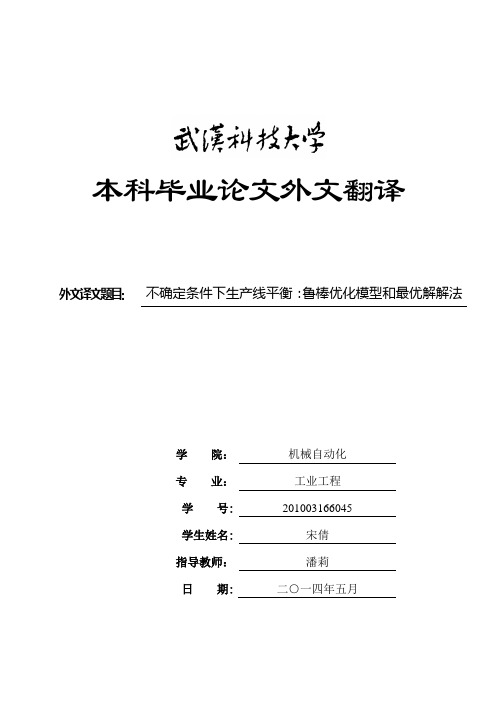
本科毕业论文外文翻译外文译文题目:不确定条件下生产线平衡:鲁棒优化模型和最优解解法学院:机械自动化专业:工业工程学号: 201003166045学生姓名: 宋倩指导教师:潘莉日期: 二○一四年五月Assembly line balancing under uncertainty: Robust optimization modelsand exact solution methodÖncü Hazır , Alexandre DolguiComputers &Industrial Engineering,2013,65:261–267不确定条件下生产线平衡:鲁棒优化模型和最优解解法安库·汉泽,亚历山大·多桂计算机与工业工程,2013,65:261–267摘要这项研究涉及在不确定条件下的生产线平衡,并提出两个鲁棒优化模型。
假设了不确定性区间运行的时间。
该方法提出了生成线设计方法,使其免受混乱的破坏。
基于分解的算法开发出来并与增强策略结合起来解决大规模优化实例.该算法的效率已被测试,实验结果也已经发表。
本文的理论贡献在于文中提出的模型和基于分解的精确算法的开发.另外,基于我们的算法设计出的基于不确定性整合的生产线的产出率会更高,因此也更具有实际意义。
此外,这是一个在装配线平衡问题上的开创性工作,并应该作为一个决策支持系统的基础。
关键字:装配线平衡;不确定性; 鲁棒优化;组合优化;精确算法1.简介装配线就是包括一系列在车间中进行连续操作的生产系统。
零部件依次向下移动直到完工。
它们通常被使用在高效地生产大量地标准件的工业行业之中。
在这方面,建模和解决生产线平衡问题也鉴于工业对于效率的追求变得日益重要。
生产线平衡处理的是分配作业到工作站来优化一些预定义的目标函数。
那些定义操作顺序的优先关系都是要被考虑的,同时也要对能力或基于成本的目标函数进行优化。
就生产(绍尔,1999)产品型号的数量来说,装配线可分为三类:单一模型(SALBP),混合模型(MALBP)和多模式(MMALBP)。
毕业论文(设计)外文文献翻译及原文
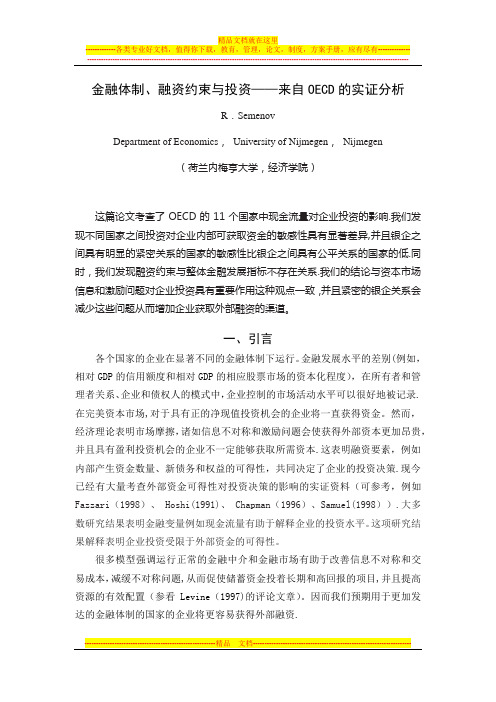
金融体制、融资约束与投资——来自OECD的实证分析R.SemenovDepartment of Economics,University of Nijmegen,Nijmegen(荷兰内梅亨大学,经济学院)这篇论文考查了OECD的11个国家中现金流量对企业投资的影响.我们发现不同国家之间投资对企业内部可获取资金的敏感性具有显著差异,并且银企之间具有明显的紧密关系的国家的敏感性比银企之间具有公平关系的国家的低.同时,我们发现融资约束与整体金融发展指标不存在关系.我们的结论与资本市场信息和激励问题对企业投资具有重要作用这种观点一致,并且紧密的银企关系会减少这些问题从而增加企业获取外部融资的渠道。
一、引言各个国家的企业在显著不同的金融体制下运行。
金融发展水平的差别(例如,相对GDP的信用额度和相对GDP的相应股票市场的资本化程度),在所有者和管理者关系、企业和债权人的模式中,企业控制的市场活动水平可以很好地被记录.在完美资本市场,对于具有正的净现值投资机会的企业将一直获得资金。
然而,经济理论表明市场摩擦,诸如信息不对称和激励问题会使获得外部资本更加昂贵,并且具有盈利投资机会的企业不一定能够获取所需资本.这表明融资要素,例如内部产生资金数量、新债务和权益的可得性,共同决定了企业的投资决策.现今已经有大量考查外部资金可得性对投资决策的影响的实证资料(可参考,例如Fazzari(1998)、 Hoshi(1991)、 Chapman(1996)、Samuel(1998)).大多数研究结果表明金融变量例如现金流量有助于解释企业的投资水平。
这项研究结果解释表明企业投资受限于外部资金的可得性。
很多模型强调运行正常的金融中介和金融市场有助于改善信息不对称和交易成本,减缓不对称问题,从而促使储蓄资金投着长期和高回报的项目,并且提高资源的有效配置(参看Levine(1997)的评论文章)。
因而我们预期用于更加发达的金融体制的国家的企业将更容易获得外部融资.几位学者已经指出建立企业和金融中介机构可进一步缓解金融市场摩擦。
毕业设计(论文)外文翻译(原文)
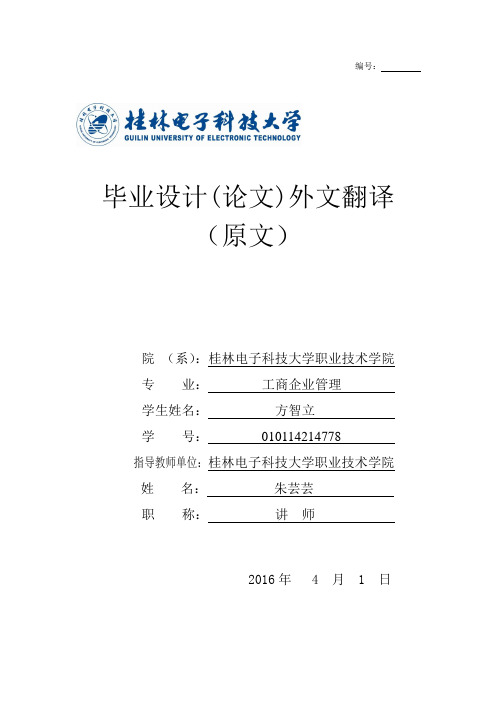
编号:毕业设计(论文)外文翻译(原文)院(系):桂林电子科技大学职业技术学院专业:工商企业管理学生姓名:方智立学号:010*********指导教师单位:桂林电子科技大学职业技术学院姓名:朱芸芸职称:讲师2016年 4 月 1 日Marketing Strategy Analysis of SportsAbstractSports market is a special industry market, which for provide exchange of sports tangible products and services market. Sports market including fixed type, such as sports facilities, sports goods market, Mobile market, such as all kinds of sports service provided by the fitness club. Sports tourism and advertising business, sports goods should be consumers to accept, and occupy a larger market. If success of the sports marketing involves many factors. According to the specific characteristics of sports marketing, develop and implement appropriate marketing strategy is very important. Sports marketing strategy is to the sports business units within a certain period or stage marketing campaign's overall development plan of decision making.This paper argues that the marketing strategy can be further subdivided into market positioning strategy, market timing strategy, market entry strategy, market development strategy, market competition strategy, Choose a strategy, must conform to the enterprise's own competitive position, product status, to grasp the market opportunity, determined according to the demands of consumers. In this paper, the sports market segmentation marketing strategy for the market positioning strategy, market timing strategy, market entry strategy, market development strategy, market competition strategy, and discusses the sports marketing how to carry out strategic choice.Keywords: Sports bazaar ; Sports marketing; Marketing strategy1.Sports marketing strategy and characteristics1.1Sports marketing strategyStrategy refers to the planning of overall and profound things. Sports marketing strategy refers to the commodity business units under the guidance of modern marketing concept, to achieve its economic goal for enterprise in a certain period of the overall design and planning of marketing development.Inan increasingly competitive market circumstances, sports business units in order to effectively carry out business activities, to achieve its business objectives, must understand and based on the characteristics of marketing concepts and strategies, and Target the demand of the market, comprehensive analysis and marketing of various environmental factors, choose effective market strategy in the background.1.2The characteristics of the sports marketing strategySports marketing strategy has sports business units within a certain period or stage marketing campaign's overall development plan of decision making. It has the characteristics of the following.(1) Overall importance.Sports marketing strategy is a matter of the global business units, including two aspects the meaning of this global:on the one hand, Sports marketing strategy is the overall design, the development of the business units, including overall planning and the overall strategy and means.On the other hand, Sports marketing strategy decision is a matter of global business units and their all-round development in the future.(2)Secular.Sports marketing strategy is really about the future of sports business units: to achieve the goals of sports marketing strategy, will make the sports business units to produce qualitative leap, but this is not usually that can be done in the short term.Important, sports business units of marketing strategy on the strategic period not only very important to enterprise's survival and development, but also to the long-term development of enterprises play an important role.(3) Systematicness.Sports systemic marketing refers to business units, each part of the work of each link is a contact each other, are closely related to the organic unity of the whole.System have layers, the size and the primary and secondary division, at the next lower level to obey and serve at the next higher level.For a certain sports and business operation entity, the strategy of the whole enterprise as a whole system engineering to overall arrangement, the pursuit of the overall development of the biggest benefits.(4)Adaptability.Sports marketing adaptability, refers to the sports marketing and business operation entity is easily affected by external and internal environment, when the environment changes, sports business units made to adapt themselves to the new environment of the characteristics of rapid response.Sports marketing of the external environment including the market demand, political or economic situation changes, policy and law changes. Similarly, sports business entities internal conditions change will impact on marketing.(5)Risk.Due to sports marketing strategy is the business unit for the marketing activities during the period development collection of expected decision, and this decision is absolutely impossible in various conditions fully mature and information fully, make and sports market, especially the intangible product variety and complexity of the market, make sports marketing strategy has the characteristics of uncertainty and instantaneity, many market opportunities tend to be a passes, no longer to, opportunity and risk coexist.2.Sports marketing strategy comprisedand choiceSports marketing strategies mainly include market positioning strategy, market timing strategy, market entry strategy, market development strategy, market competition strategy.2.1 Market orientation strategyMarket positioning refers to the sports business units according to the condition of market competition situation and its own resources, establish and develop differentiated competitive advantage, to make their own products in the consumer formed in the difference between each product unique image and is superior to the competition.This unique image can be tangible or intangible.Enterprise after analyzing the market environment, should highlight its own market advantage, establish market position, Which companies need to know on a certain level of paper generalizes, consumers mind what is the best sports products as expected.2.2 Market entry policyMarket entry strategy is the sports business units at the right time to capture the target market, how to appropriately in the two aspects of production capacity and sales ability to make reliable measures and guarantee, to ensure the decision-making of sports products successfully enter the market.Its content mainly includes the production capacity of decision-making and sales ability to form two aspects.(1) Capacity Decision. In the necessary time, sports business entities formtargetmarket capacity, is one of the important conditions to achieve market goal.Regardless of whether they are sports tangible products and intangible products, generally there are two alternative strategies.①Independent development strategy refers to both tangible products, the development of sports and development of sports intangible products. All on its own strength to expand production scale, enhance the comprehensive production capacity or adjust the structure of the comprehensive production capacity of enterprise, to adapt the demand of product combination structure. ②Comprehensive development strategy, mainly depend on the sports business units of the external forces, namely, through joint, collaboration, subcontract, form a new comprehensive production capacity. Due to participating in planning, control, coordination, etc, are more difficult. Therefore, sports business units must be good at optimizing collaborator, deal with the various cooperation of responsibility, right and benefit, to maintain good relations of cooperation.(2) Sales ability decision. A sports product to enter and occupy the market, production enterprise must have the necessary sales ability and the ability to penetrate the market.Sales ability decision-making main consideration circulation channels and sales, product should be considered when making decisions, market, enterprise, social environment and the factors such as economic effect.2.3 Market development strategyMarket development strategy refers to the perspective of market prospects, the choice of market development means, usually includes two kinds of intensive development and diversified development main form.(1)Intensive development.When some kind of sports products in the market has the potential of further development, the choice of market penetration, product development and market development of three kinds of intensive development form. As the tangible products market, in sports and intangible products are common market and applicable.①Market penetration. on the basis of the existing market scale, increase the sales of existing products. Can use a variety of measures, consolidate old customers, increase the new user. ②Product development Is through developing and improving existing products, make its have some new properties and USES, meet the social demand more. ③market development. Refers to an enterprise that open up new product sales market, in order to increase sales.(2) Diversified development.Diversity is also called the diversification, basically have concentricity scattered scattered, horizontal dispersion and the integrityof three. ①Concentricity is sports business unit USES the original dispersed development technology and the characteristics, with its as the core, the development use different structure similar products. ②Scattered level of sexual development.Was used in the original market advantage, has occupied the market development of technology, nature and purpose of different products. For example, Sports club olicy makers, can through the player transfer channels, to sell players, profit.Others use their sports club or the player's social awareness to participate in the sales promotion of goods, in order to obtain profits. ③Integrity of dispersed development. Refers to the sports business units to expand the business into its original business, technology, market and the product has no connection in the industry. Such as the sports department construction and run a catering and service hotels, hotels, entertainment city, charge for parking lot, etc., is the form of scattered holistic development. Implement the diversification development, can improve the ability of sports business units to adapt to the environment, reduce the risk of a single business, at the same time, may be more fully use of all kinds of resources within the enterprise, make its have more potential development opportunities. However, the development of decentralized often leads to complication of operation and management, and business operation entities such as diversifying some problems.2.4Strategic Marketing CompetitionThe rules of the development of the market is superior bad discard, its characteristic is the petition can promote the economic development of the enterprise and the improvement of economic benefits.Enterprises should establish a clear concept of competition, flexible use of price and non-price competition means, take a man without I have, people have my good, good people knew, new I cheap, cheap I turn the principle and method of making enterprise competitive strategy, must accomplish know fairly well the competition environment and competition situation, can with ease.Enterprise competition environment factors mainly refers to the enterprise in addition to the social and cultural environment stress factors of various aspects, such as management scientist professor Michael porter of Harvard University famous the competitive offer slightly above, an enterprise usually exist competition pressure from five aspects, namely the industry competition pressure, potential to join the pressure from the industry, suppliers forward pressure (by providing raw materials or semi-finished products, to develop into their production products), buyers.(1) The overall competitive strategy. Under different conditions, the enterprise facing the pressure of competition is different, the analysis of the pressure of competition is to understand the purpose of each kind of competition situation of power, so as to make effective competition strategy.Under normal circumstances, the sports business units of competition strategy in general have a low cost strategy, product differentiation strategy and intensive strategy. ①low-cost strategy. Low cost strategy is to point to in under the premise of guarantee the quality of products and services, efforts to reduce the cost of production and sales so that the enterprise product prices lower than competitors' prices, with rapidly expanding sales increase market share. ②Product differentiation strategies. Product differentiation strategy is to point to create a unique characteristic of the enterprise products, to develop unique products or marketing programs, for in such aspects as product or service than competitors are unique. Thus to obtain the difference advantage.The United States, for example, "NIKE" brand sports shoes, NIKE production due to the appearance of novel design, the innovation of the use function and unique, and exquisite packaging, etc., although the price is surprisingly expensive, but occupies considerable market in China, the teenagers are very loving. ③Intensive strategy. Intensive strategy refers to the enterprises focus on one or several market segments provide the most effective service, better meet certain customers with different needs, so as to strive for the local competitive advantage. It is little different from the above three kinds of overall competition strategy, successfully implement these three strategies need different resources and decision-making, also should have different requirements on organization and management.(2) The competitive strategy of enterprises of different competitive position. Where the status of enterprise in market competition, the enterprise can be divided into: market leader, market challenger, market follower. Different competitive position of enterprises, should choose different market competitive strategy.①Dominant market competition strategy. Market power refers to the related products has the highest market share. Such as the current market position and stable dominated by clothing JinMeiLong, "ADIDAS", they are price changes, new product development, sales channel width and promotional efforts in a dominant position, recognized by other sports enterprises. ②The challenger market competition strategy. Market challenger refers to those in a secondary position in the market of the enterprise, such as "lining" brand garment enterprises .Market challenger to choosechallenge object is closely related to the strategic target, for a same object has different goals and strategies Such as attack market leader to gain the market share and product advantage ;Attack power with yourself quite seize its market position; Attacking small businesses taking their customers even small business itself."Lining" to win market price advantage to the international brand, with product quality advantages to gain "anta" challenger "peak" brand's market share. ③Followers of the market competition strategy. Market followers is to point to in a secondary position, under the conditions of "coexistence" market for as much as possible the benefit of the enterprise. Market followers don't need a lot of money, less risky and can obtain high profits, so many enterprises adopt this strategy, especially the sort of small or no fame and status of sports clothing enterprises. As the current sports "philharmonic" brand clothing enterprise in the enterprise.Reference[1] LiJianJun,WangCuiHua:The Research on Marketing Environment Enterprise of Things for Sports Use in China[J] Journal of NanJing institute of sport (social science edition) 2013.(10),36 ~ 48.[2] Discuss Sports market, products and marketing characteristics. [J] journal of xi ' an institute of physical education,2012.(3)101 ~109.[3] HuZhengMing Ed. Marketing Management[M].Shandong people's publishing house,2012.302 ~325.[4] [US]Kotler write. YuLiJun translate. Introduction to Marketing[M].Huaxia Publishing House,2011.333~389.[5] ZhangTongYao.Application areas to promote the marketing advantage analysis of third party logistics[J].Market of China,2010(3)128 ~136.[6] WangHuaiShu.The influence of the logistics quality of marketing[J].Teacher's Journal,2010(3)31 ~38.[7] WangChenWen.Shallow theory of logistics strategy in the role of marketing management[J].Chemical Enterprise Management,2009(7)175 ~178.。
毕业论文外文翻译(中英文)
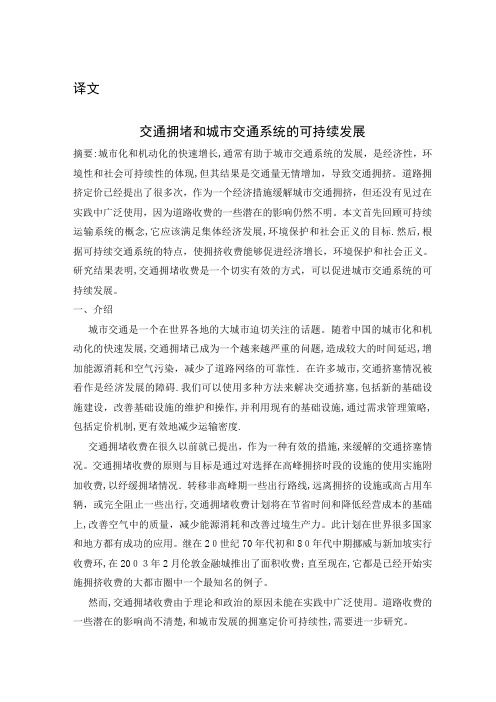
译文交通拥堵和城市交通系统的可持续发展摘要:城市化和机动化的快速增长,通常有助于城市交通系统的发展,是经济性,环境性和社会可持续性的体现,但其结果是交通量无情增加,导致交通拥挤。
道路拥挤定价已经提出了很多次,作为一个经济措施缓解城市交通拥挤,但还没有见过在实践中广泛使用,因为道路收费的一些潜在的影响仍然不明。
本文首先回顾可持续运输系统的概念,它应该满足集体经济发展,环境保护和社会正义的目标.然后,根据可持续交通系统的特点,使拥挤收费能够促进经济增长,环境保护和社会正义。
研究结果表明,交通拥堵收费是一个切实有效的方式,可以促进城市交通系统的可持续发展。
一、介绍城市交通是一个在世界各地的大城市迫切关注的话题。
随着中国的城市化和机动化的快速发展,交通拥堵已成为一个越来越严重的问题,造成较大的时间延迟,增加能源消耗和空气污染,减少了道路网络的可靠性.在许多城市,交通挤塞情况被看作是经济发展的障碍.我们可以使用多种方法来解决交通挤塞,包括新的基础设施建设,改善基础设施的维护和操作,并利用现有的基础设施,通过需求管理策略,包括定价机制,更有效地减少运输密度.交通拥堵收费在很久以前就已提出,作为一种有效的措施,来缓解的交通挤塞情况。
交通拥堵收费的原则与目标是通过对选择在高峰拥挤时段的设施的使用实施附加收费,以纾缓拥堵情况.转移非高峰期一些出行路线,远离拥挤的设施或高占用车辆,或完全阻止一些出行,交通拥堵收费计划将在节省时间和降低经营成本的基础上,改善空气中的质量,减少能源消耗和改善过境生产力。
此计划在世界很多国家和地方都有成功的应用。
继在20世纪70年代初和80年代中期挪威与新加坡实行收费环,在2003年2月伦敦金融城推出了面积收费;直至现在,它都是已经开始实施拥挤收费的大都市圈中一个最知名的例子。
然而,交通拥堵收费由于理论和政治的原因未能在实践中广泛使用。
道路收费的一些潜在的影响尚不清楚,和城市发展的拥塞定价可持续性,需要进一步研究。
毕业设计(论文)外文翻译【范本模板】
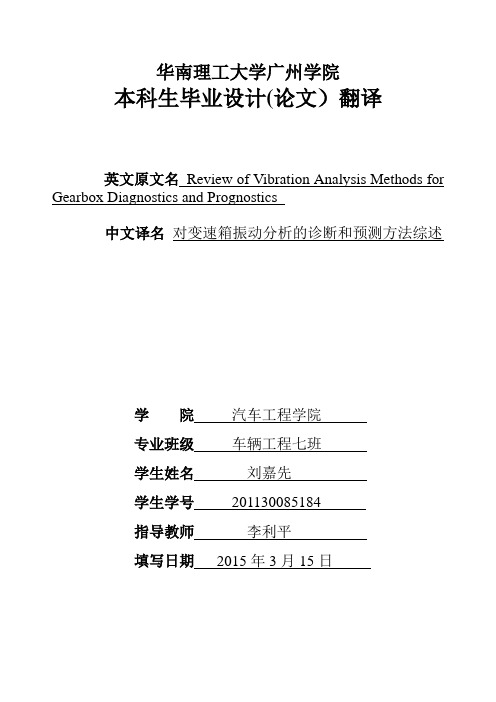
华南理工大学广州学院本科生毕业设计(论文)翻译英文原文名Review of Vibration Analysis Methods for Gearbox Diagnostics and Prognostics中文译名对变速箱振动分析的诊断和预测方法综述学院汽车工程学院专业班级车辆工程七班学生姓名刘嘉先学生学号201130085184指导教师李利平填写日期2015年3月15日英文原文版出处:Proceedings of the 54th Meeting of the Society for Machinery Failure Prevention Technology, Virginia Beach,V A, May 1-4,2000,p. 623-634译文成绩:指导教师(导师组长)签名:译文:简介特征提取技术在文献中有描述;然而,大多数人似乎掩盖所需的特定的预处理功能。
一些文件没有提供足够的细节重现他们的结果,并没有一个全面的比较传统的功能过渡齿轮箱数据。
常用术语,如“残差信号”,是指在不同的文件不同的技术.试图定义了状态维修社区中的常用术语和建立所需的特定的预处理加工特性。
本文的重点是对所使用的齿轮故障检测功能。
功能分为五个不同的组基于预处理的需要。
论文的第一部分将提供预处理流程的概述和其中每个特性计算的处理方案。
在下一节中,为特征提取技术描述,将更详细地讨论每一个功能。
最后一节将简要概述的宾夕法尼亚州立大学陆军研究实验室的CBM工具箱用于齿轮故障诊断。
特征提取概述许多类型的缺陷或损伤会增加机械振动水平。
这些振动水平,然后由加速度转换为电信号进行数据测量。
原则上,关于受监视的计算机的健康的信息被包含在这个振动签名。
因此,新的或当前振动签名可以与以前的签名进行比较,以确定该元件是否正常行为或显示故障的迹象。
在实践中,这种比较是不能奏效的。
由于大的变型中,签名的直接比较是困难的。
相反,一个涉及从所述振动署名数据特征提取更多有用的技术也可以使用。
毕业论文英语翻译及原文
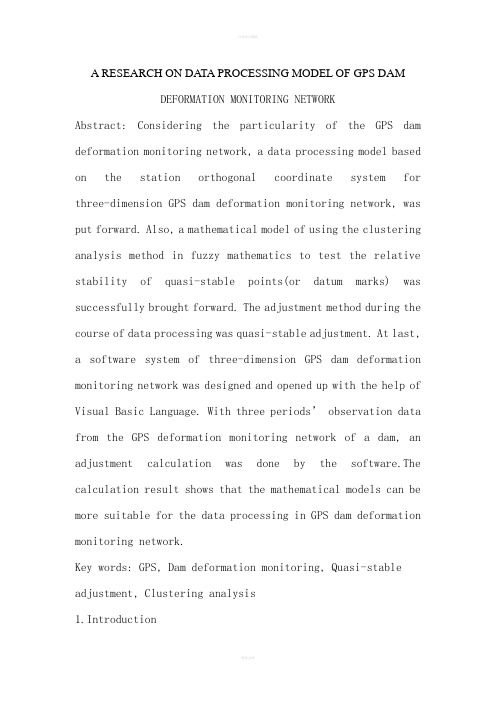
=H( - )(1)
respectively, the expression can be easily gained as follows
Then, the relation equation between the two baseline vectors is expressedas
There are two steps in the GPS observation data processing course. They are baseline calculationand network adjustment. The baseline vectors in WGS-84 can be firstly got using baseline calculation.Secondly, the baseline vector transformation from WGS-84 to the station orthogonal coordinatesystem can be done with (3). At last, the adjustment of GPS deformatihestation orthogonal coordinate system can be successfully finished.
If the position vector of the station orthogonal coordinate system originP0inWGS-84 isexpressed as = , according to thegeodetic latitude and longitude( , ), theposition vector
毕业论文英文翻译
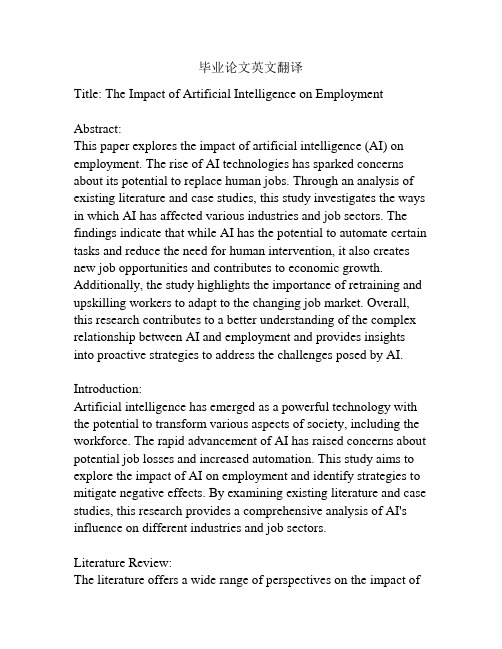
毕业论文英文翻译Title: The Impact of Artificial Intelligence on Employment Abstract:This paper explores the impact of artificial intelligence (AI) on employment. The rise of AI technologies has sparked concerns about its potential to replace human jobs. Through an analysis of existing literature and case studies, this study investigates the ways in which AI has affected various industries and job sectors. The findings indicate that while AI has the potential to automate certain tasks and reduce the need for human intervention, it also creates new job opportunities and contributes to economic growth. Additionally, the study highlights the importance of retraining and upskilling workers to adapt to the changing job market. Overall, this research contributes to a better understanding of the complex relationship between AI and employment and provides insights into proactive strategies to address the challenges posed by AI. Introduction:Artificial intelligence has emerged as a powerful technology with the potential to transform various aspects of society, including the workforce. The rapid advancement of AI has raised concerns about potential job losses and increased automation. This study aims to explore the impact of AI on employment and identify strategies to mitigate negative effects. By examining existing literature and case studies, this research provides a comprehensive analysis of AI's influence on different industries and job sectors.Literature Review:The literature offers a wide range of perspectives on the impact ofAI on employment. Some studies suggest that AI will lead to significant job losses in sectors such as manufacturing, transportation, and customer service. They argue that AI technologies, such as autonomous vehicles and chatbots, can perform tasks previously done by humans more efficiently and at a lower cost. On the other hand, other studies argue that AI will create new job opportunities and enhance productivity. For example, the healthcare sector benefits from AI technologies by improving diagnosis accuracy and streamlining administrative processes.Case Studies:This study includes several case studies that examine the impact of AI on specific industries. The manufacturing industry, for instance, has experienced both job losses and job creation due to the introduction of AI. While certain tasks have been automated, new roles related to AI maintenance and programming have emerged. Similarly, the retail industry has witnessed the integration of AI technologies, leading to job displacement in traditional retail jobs but also the creation of new positions in data analysis and online customer support.Mitigation Strategies:To address the challenges posed by AI, strategies should focus on retraining and upskilling the workforce to adapt to the changing job market. Governments and organizations should encourage workers to acquire in-demand skills such as data analysis and AI programming. Additionally, collaboration between academia and industry is crucial to ensure that education and training programs remain relevant and effective. Finally, policies that support jobtransition and income support for displaced workers will help minimize the negative impact of AI on employment. Conclusion:The impact of artificial intelligence on employment is a complex and multifaceted issue. While concerns about job losses are valid, it is important to recognize that AI also creates new job opportunities and contributes to economic growth. By implementing proactive strategies, such as retraining and upskilling, societies can better navigate the changes brought about by AI and ensure a future where humans and machines can coexist harmoniously.。
毕业论文外文翻译范例
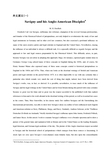
外文原文(一)Savigny and his Anglo-American Disciple s*M. H. HoeflichFriedrich Carl von Savigny, nobleman, law reformer, champion of the revived German professoriate, and founder of the Historical School of jurisprudence, not only helped to revolutionize the study of law and legal institutions in Germany and in other civil law countries, but also exercised a profound influence on many of the most creative jurists and legal scholars in England and the United States. Nevertheless, tracing the influence of an individual is always a difficult task. It is especially difficult as regards Savigny and the approach to law and legal sources propounded by the Historical School. This difficulty arises, in part, because Savigny was not alone in adopting this approach. Hugo, for instance, espoused quite similar ideas in Germany; George Long echoed many of these concepts in England during the 1850s, and, of course, Sir Henry Sumner Maine also espoused many of these same concepts central to historical jurisprudence in England in the 1860s and 1870s. Thus, when one looks at the doctrinal writings of British and American jurists and legal scholars in the period before 1875, it is often impossible to say with any certainty that a particular idea which sounds very much the sort of thing that might, indeed, have been derived from Savigny's works, was, in fact, so derived. It is possible, nevertheless, to trace much of the influence of Savigny and his legal writings in the United States and in Great Britain during this period with some certainty because so great was his fame and so great was the respect accorded to his published work that explicit references to him and to his work abound in the doctrinal writing of this period, as well as in actual law cases in the courts. Thus, Max Gutzwiller, in his classic study Der einfluss Savignys auf die Entwicklung des International privatrechts, was able to show how Savigny's ideas on conflict of laws influenced such English and American scholars as Story, Phillimore, Burge, and Dicey. Similarly, Andreas Schwarz, in his "Einflusse Deutscher Zivilistik im Auslande," briefly sketched Savigny's influence upon John Austin, Frederick Pollock, and James Bryce. In this article I wish to examine Savigny's influence over a broader spectrum and to draw a picture of his general fame and reputation both in Britain and in the United States as the leading Romanist, legal historian, and German legal academic of his day. The picture of this Anglo-American respect accorded to Savigny and the historical school of jurisprudence which emerges from these sources is fascinating. It sheds light not only upon Savigny’s trans-channel, trans-Atlantic fame, but also upon the extraordinarily*M.H.Hoeflich, Savigny and his Anglo-American Disciples, American Journal of Comparative Law, vol.37, No.1, 1989.cosmopolitan outlook of many of the leading American and English jurists of the time. Of course, when one sets out to trace the influence of a particular individual and his work, it is necessary to demonstrate, if possible, precisely how knowledge of the man and his work was transmitted. In the case of Savigny and his work on Roman law and ideas of historical jurisprudence, there were three principal modes of transmission. First, there was the direct influence he exercised through his contacts with American lawyers and scholars. Second, there was the influence he exercised through his books. Third, there was the influence he exerted indirectly through intermediate scholars and their works. Let us examine each mode separately.I.INFLUENCE OF THE TRANSLATED WORKSWhile American and British interest in German legal scholarship was high in the antebellum period, the number of American and English jurists who could read German fluently was relatively low. Even those who borrowed from the Germans, for instance, Joseph Story, most often had to depend upon translations. It is thus quite important that Savigny’s works were amongst the most frequently translated into English, both in the United States and in Great Britain. His most influential early work, the Vom Beruf unserer Zeitfur Rechtsgeschichte und Gestzgebung, was translated into English by Abraham Hayward and published in London in 1831. Two years earlier the first volume of his History of Roman Law in the Middle Ages was translated by Cathcart and published in Edinburgh. In 1830, as well, a French translation was published at Paris. Sir Erskine Perry's translation of Savigny's Treatise on Possession was published in London in 1848. This was followed by Archibald Brown's epitome of the treatise on possession in 1872 and Rattigan's translation of the second volume of the System as Jural Relations or the Law of Persons in 1884. Guthrie published a translation of the seventh volume of the System as Private International Law at Edinburgh in 1869. Indeed, two English translations were even published in the far flung corners of the British Raj. A translation of the first volume of the System was published by William Holloway at Madras in 1867 and the volume on possession was translated by Kelleher and published at Calcutta in 1888. Thus, the determined English-speaking scholar had ample access to Savigny's works throughout the nineteenth century.Equally important for the dissemination of Savigny's ideas were those books and articles published in English that explained and analyzed his works. A number of these must have played an important role in this process. One of the earliest of these is John Reddie's Historical Notices of the Roman law and of the Progress of its Study in Germany, published at Edinburgh in 1826. Reddie was a noted Scots jurist and held the Gottingen J.U.D. The book, significantly, is dedicated to Gustav Hugo. It is of that genre known as an external history of Roman law-not so much a history of substantive Roman legal doctrine but rather a historyof Roman legal institutions and of the study of Roman law from antiquity through the nineteenth century. It is very much a polemic for the study of Roman law and for the Historical School. It imparts to the reader the excitement of Savigny and his followers about the study of law historically and it is clear that no reader of the work could possibly be left unmoved. It is, in short, the first work of public relations in English on behalf of Savigny and his ideas.Having mentioned Reddie's promotion of Savigny and the Historical School, it is important to understand the level of excitement with which things Roman and especially Roman law were greeted during this period. Many of the finest American jurists were attracted-to use Peter Stein's term-to Roman and Civil law, but attracted in a way that, at times, seems to have been more enthusiastic than intellectual. Similarly, Roman and Civil law excited much interest in Great Britain, as illustrated by the distinctly Roman influence to be found in the work of John Austin. The attraction of Roman and Civil law can be illustrated and best understood, perhaps, in the context of the publicity and excitement in the English-speaking world surrounding the discovery of the only complete manuscript of the classical Roman jurist Gaius' Institutes in Italy in 1816 by the ancient historian and German consul at Rome, B.G. Niebuhr. Niebuhr, the greatest ancient historian of his time, turned to Savigny for help with the Gaius manuscript (indeed, it was Savigny who recognized the manuscript for what it was) and, almost immediately, the books and journals-not just law journals by any means-were filled with accounts of the discovery, its importance to legal historical studies, and, of course, what it said. For instance, the second volume of the American Jurist contains a long article on the civil law by the scholarly Boston lawyer and classicist, John Pickering. The first quarter of the article is a gushing account of the discovery and first publication of the Gaius manuscript and a paean to Niebuhr and Savigny for their role in this. Similarly, in an article published in the London Law Magazine in 1829 on the civil law, the author contemptuously refers to a certain professor who continued to tell his students that the text of Gaius' Institutes was lost for all time. What could better show his ignorance of all things legal and literary than to be unaware of Niebuhr's great discovery?Another example of this reaction to the discovery of the Gaius palimpsest is to be found in David Irving's Introduction to the Study of the Civil Law. This volume is also more a history of Roman legal scholarship and sources than a study of substantive Roman law. Its pages are filled with references to Savigny's Geschichte and its approach clearly reflects the influence of the Historical School. Indeed, Irving speaks of Savigny's work as "one of the most remarkable productions of the age." He must have been truly impressed with German scholarship and must also have been able to convince the Faculty of Advocates, forwhom he was librarian, of the worth of German scholarship, for in 1820 the Faculty sent him to Gottingen so that he might study their law libraries. Irving devotes several pages of his elementary textbook on Roman law to the praise of the "remarkable" discovery of the Gaius palimpsest. He traces the discovery of the text by Niebuhr and Savigny in language that would have befitted an adventure tale. He elaborates on the various labors required to produce a new edition of the text and was particularly impressed by the use of a then new chemical process to make the under text of the palimpsest visible. He speaks of the reception of the new text as being greeted with "ardor and exultation" strong words for those who spend their lives amidst the "musty tomes" of the Roman law.This excitement over the Verona Gaius is really rather strange. Much of the substance of the Gaius text was already known to legal historians and civil lawyers from its incorporation into Justinian's Institutes and so, from a substantive legal perspective, the find was not crucial. The Gaius did provide new information on Roman procedural rules and it did also provide additional information for those scholars attempting to reconstruct pre-Justinianic Roman law. Nevertheless, these contributions alone seem hardly able to justify the excitement the discovery caused. Instead, I think that the Verona Gaius discovery simply hit a chord in the literary and legal community much the same as did the discovery of the Rosetta Stone or of Schliemann’s Troy. Here was a monument of a great civilization brought newly to light and able to be read for the first time in millenia. And just as the Rosetta Stone helped to establish the modern discipline of Egyptology and Schliemann's discoveries assured the development of classical archaeology as a modern academic discipline, the discovery of the Verona Gaius added to the attraction Roman law held for scholars and for lawyers, even amongst those who were not Romanists by profession. Ancillary to this, the discovery and publication of the Gaius manuscript also added to the fame of the two principals involved in the discovery, Niebuhr and Savigny. What this meant in the English-speaking world is that even those who could not or did not wish to read Savigny's technical works knew of him as one of the discoverers of the Gaius text. This fame itself may well have helped in spreading Savigny's legal and philosophical ideas, for, I would suggest, the Gaius "connection" may well have disposed people to read other of Savigny's writings, unconnected to the Gaius, because they were already familiar with his name.Another example of an English-speaking promoter of Savigny is Luther Stearns Cushing, a noted Boston lawyer who lectured on Roman law at the Harvard Law School in 1848-49 and again in 1851- 1852.Cushing published his lectures at Boston in 1854 under the title An Introduction to the Study of Roman Law. He devoted a full chapter to a description of the historical school and to the controversy betweenSavigny and Thibaut over codification. While Cushing attempted to portray fairly the arguments of both sides, he left no doubt as to his preference for Savigny's approach:The labors of the historical school have established an entirely new and distinct era in the study of the Roman jurisprudence; and though these writers cannot be said to have thrown their predecessors into the shade, it seems to be generally admitted, that almost every branch of the Roman law has received some important modification at their hands, and that a knowledge of their writings, to some extent, at least, is essentially necessary to its acquisition.译文(一)萨维尼和他的英美信徒们*M·H·豪弗里奇弗雷德里奇·卡尔·冯·萨维尼出身贵族,是一位出色的法律改革家,也是一位倡导重建德国教授协会的拥护者,还是历史法学派的创建人之一。
毕业论文文献外文翻译----危机管理:预防,诊断和干预文献翻译-中英文文献对照翻译
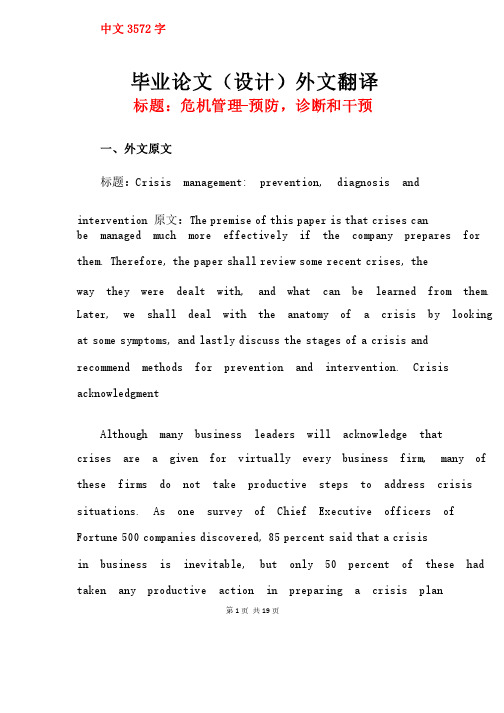
第1页 共19页中文3572字毕业论文(设计)外文翻译标题:危机管理-预防,诊断和干预一、外文原文标题:标题:Crisis management: prevention, diagnosis and Crisis management: prevention, diagnosis andintervention 原文:原文:The Thepremise of this paper is that crises can be managed much more effectively if the company prepares for them. Therefore, the paper shall review some recent crises, theway they were dealt with, and what can be learned from them. Later, we shall deal with the anatomy of a crisis by looking at some symptoms, and lastly discuss the stages of a crisis andrecommend methods for prevention and intervention. Crisis acknowledgmentAlthough many business leaders will acknowledge thatcrises are a given for virtually every business firm, many of these firms do not take productive steps to address crisis situations. As one survey of Chief Executive officers of Fortune 500 companies discovered, 85 percent said that a crisisin business is inevitable, but only 50 percent of these had taken any productive action in preparing a crisis plan(Augustine, 1995). Companies generally go to great lengths to plan their financial growth and success. But when it comes to crisis management, they often fail to think and prepare for those eventualities that may lead to a company’s total failure.Safety violations, plants in need of repairs, union contracts, management succession, and choosing a brand name, etc. can become crises for which many companies fail to be prepared untilit is too late.The tendency, in general, is to look at the company as a perpetual entity that requires plans for growth. Ignoring the probabilities of disaster is not going to eliminate or delay their occurrences. Strategic planning without inclusion ofcrisis management is like sustaining life without guaranteeinglife. One reason so many companies fail to take steps to proactively plan for crisis events, is that they fail to acknowledge the possibility of a disaster occurring. Like an ostrich with its head in the sand, they simply choose to ignorethe situation, with the hope that by not talking about it, it will not come to pass. Hal Walker, a management consultant, points out “that decisions will be more rational and better received, and the crisis will be of shorter duration, forcompanies who prepare a proactive crisis plan” (Maynard, 1993) .It is said that “there are two kinds of crises: those that thatyou manage, and those that manage you” (Augustine, 1995). Proactive planning helps managers to control and resolve a crisis. Ignoring the possibility of a crisis, on the other hand,could lead to the crisis taking a life of its own. In 1979, theThree-Mile Island nuclear power plant experienced a crisis whenwarning signals indicated nuclear reactors were at risk of a meltdown. The system was equipped with a hundred or more different alarms and they all went off. But for those who shouldhave taken the necessary steps to resolve the situation, therewere no planned instructions as to what should be done first. Hence, the crisis was not acknowledged in the beginning and itbecame a chronic event.In June 1997, Nike faced a crisis for which they had no existi existing frame of reference. A new design on the company’s ng frame of reference. A new design on the company’s Summer Hoop line of basketball shoes - with the word air writtenin flaming letters - had sparked a protest by Muslims, who complained the logo resembled the Arabic word for Allah, or God.The council of American-Islamic Relations threatened aa globalNike boycott. Nike apologized, recalled 38,000 pairs of shoes,and discontinued the line (Brindley, 1997). To create the brand,Nike had spent a considerable amount of time and money, but hadnever put together a general framework or policy to deal with such controversies. To their dismay, and financial loss, Nike officials had no choice but to react to the crisis. This incident has definitely signaled to the company that spending a little more time would have prevented the crisis. Nonetheless,it has taught the company a lesson in strategic crisis management planning.In a business organization, symptoms or signals can alert the strategic planners or executives of an eminent crisis. Slipping market share, losing strategic synergy anddiminishing productivity per man hour, as well as trends, issues and developments in the socio-economic, political and competitive environments, can signal crises, the effects of which can be very detrimental. After all, business failures and bankruptcies are not intended. They do not usually happen overnight. They occur more because of the lack of attention to symptoms than any other factor.Stages of a crisisMost crises do not occur suddenly. The signals can usuallybe picked up and the symptoms checked as they emerge. A company determined to address these issues realizes that the real challenge is not just to recognize crises, but to recognize themin a timely fashion (Darling et al., 1996). A crisis can consistof four different and distinct stages (Fink, 1986). The phasesare: prodromal crisis stage, acute crisis stage, chronic crisisstage and crisis resolution stage.Modern organizations are often called “organic” due tothe fact that they are not immune from the elements of their surrounding environments. Very much like a living organism, organizations can be affected by environmental factors both positively and negatively. But today’s successfulorganizations are characterized by the ability to adapt by recognizing important environmental factors, analyzing them, evaluating the impacts and reacting to them. The art of strategic planning (as it relates to crisis management)involves all of the above activities. The right strategy, in general, provides for preventive measures, and treatment or resolution efforts both proactively and reactively. It wouldbe quite appropriate to examine the first three stages of acrisis before taking up the treatment, resolution or intervention stage.Prodromal crisis stageIn the field of medicine, a prodrome is a symptom of the onset of a disease. It gives a warning signal. In business organizations, the warning lights are always blinking. No matter how successful the organization, a number of issues andtrends may concern the business if proper and timely attentionis paid to them. For example, in 1995, Baring Bank, a UK financial institution which had been in existence since 1763,ample opportunitysuddenly and unexpectedly failed. There wasfor the bank to catch the signals that something bad was on thehorizon, but the company’s efforts to detect that were thwarted by an internal structure that allowed a single employee both to conduct and to oversee his own investment trades, and the breakdown of management oversight and internalcontrol systems (Mitroff et al., 1996). Likewise, looking in retrospect, McDonald’s fast food chain was given the prodromalsymptoms before the elderly lady sued them for the spilling ofa very hot cup of coffee on her lap - an event that resulted in a substantial financial loss and tarnished image of thecompany. Numerous consumers had complained about thetemperature of the coffee. The warning light was on, but the company did not pay attention. It would have been much simplerto pick up the signal, or to check the symptom, than facing the consequences.In another case, Jack in the Box, a fast food chain, had several customers suffer intestinal distress after eating at their restaurants. The prodromal symptom was there, but the company took evasive action. Their initial approach was to lookaround for someone to blame. The lack of attention, the evasiveness and the carelessness angered all the constituent groups, including their customers. The unfortunate deaths thatptoms,occurred as a result of the company’s ignoring thesymand the financial losses that followed, caused the company to realize that it would have been easier to manage the crisis directly in the prodromal stage rather than trying to shift theblame.Acute crisis stageA prodromal stage may be oblique and hard to detect. The examples given above, are obvious prodromal, but no action wasWebster’s New Collegiate Dictionary, an acute stage occursacutewhen a symptom “demands urgent attention.” Whether the acutesymptom emerges suddenly or is a transformation of a prodromalstage, an immediate action is required. Diverting funds and other resources to this emerging situation may cause disequilibrium and disturbance in the whole system. It is onlythose organizations that have already prepared a framework forthese crises that can sustain their normal operations. For example, the US public roads and bridges have for a long time reflected a prodromal stage of crisis awareness by showing cracks and occasionally a collapse. It is perhaps in light of the obsessive decision to balance the Federal budget that reacting to the problem has been delayed and ignored. This situation has entered an acute stage and at the time of this writing, it was reported that a bridge in Maryland had just collapsed.The reason why prodromes are so important to catch is thatit is much easier to manage a crisis in this stage. In the caseof most crises, it is much easier and more reliable to take careof the problem before it becomes acute, before it erupts and causes possible complications (Darling et al., 1996). In andamage. However, the losses are incurred. Intel, the largest producer of computer chips in the USA, had to pay an expensiveprice for initially refusing to recall computer chips that proved unreliable o n on certain calculations. The f irmfirm attempted to play the issue down and later learned its lesson. At an acutestage, when accusations were made that the Pentium Chips were not as fast as they claimed, Intel quickly admitted the problem,apologized for it, and set about fixing it (Mitroff et al., 1996). Chronic crisis stageDuring this stage, the symptoms are quite evident and always present. I t isIt is a period of “make or break.” Being the third stage, chronic problems may prompt the company’s management to once and for all do something about the situation. It may be the beginning of recovery for some firms, and a deathknell for others. For example, the Chrysler Corporation was only marginallysuccessful throughout the 1970s. It was not, however, until the company was nearly bankrupt that amanagement shake-out occurred. The drawback at the chronic stage is that, like in a human patient, the company may get used to “quick fixes” and “band “band--aid”approaches. After all, the ailment, the problem and the crisis have become an integral partoverwhelmed by prodromal and acute problems that no time or attention is paid to the chronic problems, or the managers perceive the situation to be tolerable, thus putting the crisison a back burner.Crisis resolutionCrises could be detected at various stages of their development. Since the existing symptoms may be related todifferent problems or crises, there is a great possibility thatthey may be misinterpreted. Therefore, the people in charge maybelieve they have resolved the problem. However, in practicethe symptom is often neglected. In such situations, the symptomwill offer another chance for resolution when it becomes acute,thereby demanding urgent care. Studies indicate that today anincreasing number of companies are issue-oriented and searchfor symptoms. Nevertheless, the lack of experience in resolvinga situation and/or inappropriate handling of a crisis can leadto a chronic stage. Of course, there is this last opportunityto resolve the crisis at the chronic stage. No attempt to resolve the crisis, or improper resolution, can lead to grim consequences that will ultimately plague the organization or even destroy it.It must be noted that an unsolved crisis may not destroy the company. But, its weakening effects can ripple through the organization and create a host of other complications.Preventive effortsThe heart of the resolution of a crisis is in the preventiveefforts the company has initiated. This step, similar to a humanbody, is actually the least expensive, but quite often the mostoverlooked. Preventive measures deal with sensing potential problems (Gonzales-Herrero and Pratt, 1995). Major internalfunctions of a company such as finance, production, procurement, operations, marketing and human resources are sensitive to thesocio-economic, political-legal, competitive, technological, demographic, global and ethical factors of the external environment. What is imminently more sensible and much more manageable, is to identify the processes necessary forassessing and dealing with future crises as they arise (Jacksonand Schantz, 1993). At the core of this process are appropriate information systems, planning procedures, anddecision-making techniques. A soundly-based information system will scan the environment, gather appropriate data, interpret this data into opportunities and challenges, and provide a concretefoundation for strategies that could function as much to avoid crises as to intervene and resolve them.Preventive efforts, as stated before, require preparations before any crisis symptoms set in. Generally strategic forecasting, contingency planning, issues analysis, and scenario analysis help to provide a framework that could be used in avoiding and encountering crises.出处:出处:Toby TobyJ. Kash and John R. Darling . Crisis management: prevention, diagnosis 179-186二、翻译文章标题:危机管理:预防,诊断和干预译文:本文的前提是,如果该公司做好准备得话,危机可以更有效地进行管理。
法学毕业论文法学外文翻译中英文对照
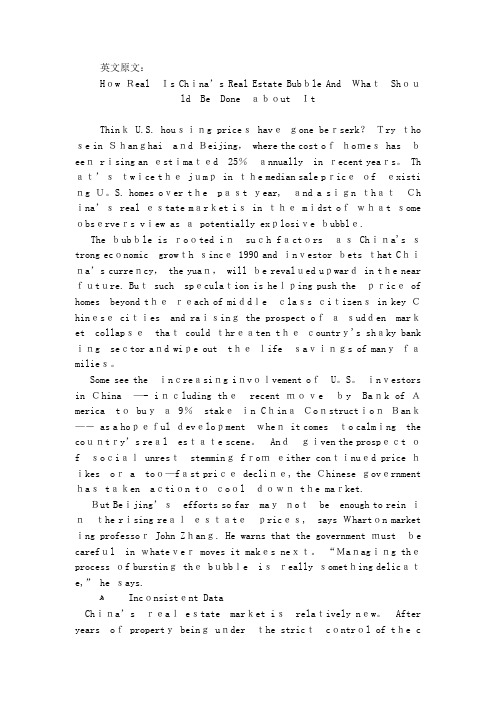
英文原文:How Real Is China’s Real Estate Bubble And WhatShould Be Done about ItThink U.S. housing prices havegone berserk?Try tho se in Shanghai and Beijing, where the cost ofhomes has been rising an estimated 25%annually in recent years。
Th at’stwice the jump in the median sale priceof existi ng U。
S. homes over the past year, and a sign thatCh ina’s real estate market is in the midst ofwhat some observers view as a potentially explosive bubble.The bubble is rooted insuch factors as China's strong economic growth since 1990 and investor bets that China’s currency, the yuan, will be revalued upward in the near future. But such speculation is helping push the price of homes beyond thereach of middle class citizens in key Chinese cities and raising the prospect ofasudden market collapsethat could threaten thecountry's shaky bank ing sector and wipe out thelife savings of manyfamilies。
毕业论文英文文献翻译
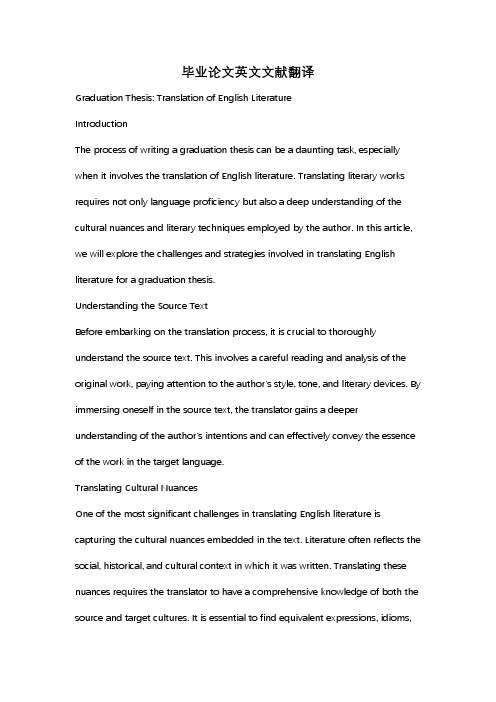
毕业论文英文文献翻译Graduation Thesis: Translation of English LiteratureIntroductionThe process of writing a graduation thesis can be a daunting task, especially when it involves the translation of English literature. Translating literary works requires not only language proficiency but also a deep understanding of the cultural nuances and literary techniques employed by the author. In this article, we will explore the challenges and strategies involved in translating English literature for a graduation thesis.Understanding the Source TextBefore embarking on the translation process, it is crucial to thoroughly understand the source text. This involves a careful reading and analysis of the original work, paying attention to the author's style, tone, and literary devices. By immersing oneself in the source text, the translator gains a deeper understanding of the author's intentions and can effectively convey the essence of the work in the target language.Translating Cultural NuancesOne of the most significant challenges in translating English literature is capturing the cultural nuances embedded in the text. Literature often reflects the social, historical, and cultural context in which it was written. Translating these nuances requires the translator to have a comprehensive knowledge of both the source and target cultures. It is essential to find equivalent expressions, idioms,or metaphors that resonate with the target audience while staying true to the original intent of the author.Maintaining Literary TechniquesEnglish literature is renowned for its rich use of literary techniques such as symbolism, imagery, and wordplay. Translating these techniques poses a considerable challenge as they may not have direct equivalents in the target language. The translator must strive to retain the artistic essence of the original work while adapting it to the linguistic and cultural constraints of the target language. This requires creativity and a keen eye for detail to ensure that the translated work captures the same aesthetic impact as the source text. Adapting to Linguistic DifferencesLanguages differ not only in vocabulary but also in grammatical structures and syntax. Translating English literature into another language often involves adapting the sentence structure and grammar to ensure fluency and coherence in the target language. The translator must strike a delicate balance between staying faithful to the original text and making necessary adjustments to ensure readability and comprehension for the target audience.The Role of the TranslatorA translator of English literature for a graduation thesis is not merely a conduit for transferring words from one language to another. They are responsible for bridging the gap between cultures, enabling readers to experience the essence of the original work in their native language. A successful translator mustpossess a deep appreciation for both the source and target cultures, as well as the literary techniques employed by the author. They must strive to create a translation that captures the spirit of the original work while being accessible and engaging to the target audience.ConclusionTranslating English literature for a graduation thesis is a challenging yet rewarding endeavor. It requires a combination of linguistic proficiency, cultural understanding, and literary sensibility. By carefully analyzing the source text, capturing cultural nuances, maintaining literary techniques, adapting to linguistic differences, and embodying the role of a translator, one can successfully translate English literature for a graduation thesis. Through this process, the translator not only contributes to academic research but also fosters cross-cultural understanding and appreciation for the beauty of literature.。
毕业设计(论文)外文翻译
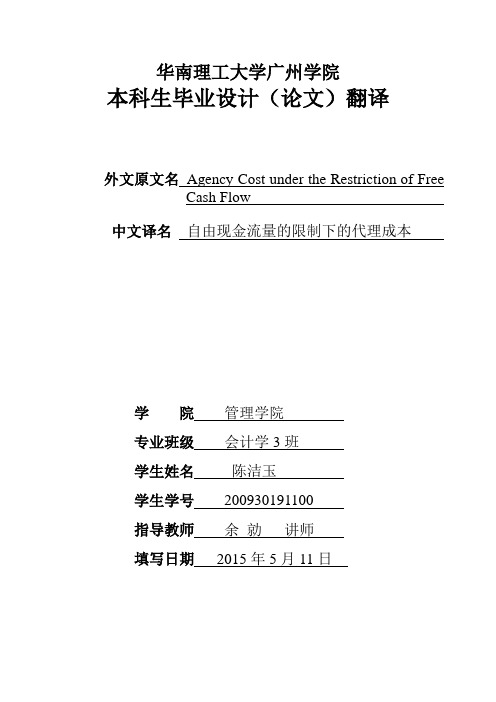
华南理工大学广州学院本科生毕业设计(论文)翻译外文原文名Agency Cost under the Restriction of Free Cash Flow中文译名自由现金流量的限制下的代理成本学院管理学院专业班级会计学3班学生姓名陈洁玉学生学号200930191100指导教师余勍讲师填写日期2015年5月11日外文原文版出处:译文成绩:指导教师(导师组长)签名:译文:自由现金流量的限制下的代理成本摘要代理成本理论是资本结构理论的一个重要分支。
自由现金流代理成本有显着的影响。
在这两个领域相结合的研究,将有助于建立和扩大理论体系。
代理成本理论基础上,本研究首先分类自由现金流以及统计方法的特点。
此外,投资自由现金流代理成本的存在证明了模型。
自由现金流代理成本理论引入限制,分析表明,它会改变代理成本,进而将影响代理成本和资本结构之间的关系,最后,都会影响到最优资本结构点,以保持平衡。
具体地说,自由现金流增加,相应地,债务比例会降低。
关键词:资本结构,现金流,代理成本,非金钱利益1、介绍代理成本理论,金融契约理论,信号模型和新的啄食顺序理论,新的资本结构理论的主要分支。
财务con-道的理论侧重于限制股东的合同行为,解决股东和债权人之间的冲突。
信令模式和新的啄食顺序理论中心解决投资者和管理者之间的冲突。
这两种类型的冲突是在商业组织中的主要冲突。
代理成本理论认为,如何达到平衡这两种类型的冲突,资本结构是如何形成的,这是比前两次在一定程度上更多的理论更全面。
……Agency Cost under the Restriction of Free Cash FlowAbstractAgency cost theory is an important branch of capital structural theory. Free cash flow has significant impact on agency cost. The combination of research on these two fields would help to build and extend the theoretical system. Based on agency cost theory, the present study firstly categorized the characteristics of free cash flow as well as the statistical methodologies. Furthermore, the existence of investing free cash flow in agency cost was proved by a model. Then free cash flow was introduced into agency cost theory as restriction, the analysis shows that it will change agency cost, in turn, will have an impact on the relationship between agency cost and capital structure, finally, will influence the optimal capital structure point to maintain the equilibrium. Concretely, with the increasing free cash flow, correspondingly, debt proportion will decrease.Keywords:Capital Structure,Free Cash Flow,Agency Cost,Non-Pecuniary Benefit1. IntroductionAgency cost theory, financial contract theory, signaling model and new pecking order theory are the main branches of new capital structure theory. Financial con-tract theory focuses on restricting stockholders’ behavior by contract and solving the conflict between stockholders and creditors. Signaling model and new pecking order theory center on solving the conflict between investors and managers. These two types of conflict are the main conflict in business organizations. Agency cost theory considers how equilibrium is reached in both types of conflict and how capital structure is formed, which is more theory is more comprehensive than the previous two to some degree.……。
毕业论文英语翻译
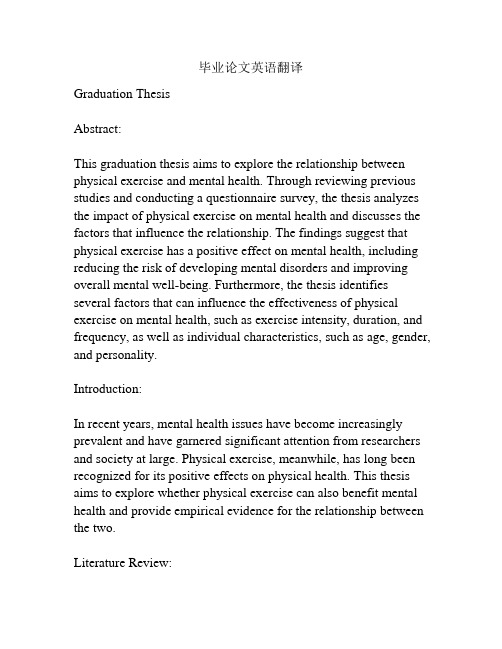
毕业论文英语翻译Graduation ThesisAbstract:This graduation thesis aims to explore the relationship between physical exercise and mental health. Through reviewing previous studies and conducting a questionnaire survey, the thesis analyzes the impact of physical exercise on mental health and discusses the factors that influence the relationship. The findings suggest that physical exercise has a positive effect on mental health, including reducing the risk of developing mental disorders and improving overall mental well-being. Furthermore, the thesis identifies several factors that can influence the effectiveness of physical exercise on mental health, such as exercise intensity, duration, and frequency, as well as individual characteristics, such as age, gender, and personality.Introduction:In recent years, mental health issues have become increasingly prevalent and have garnered significant attention from researchers and society at large. Physical exercise, meanwhile, has long been recognized for its positive effects on physical health. This thesis aims to explore whether physical exercise can also benefit mental health and provide empirical evidence for the relationship between the two.Literature Review:The literature review examines previous studies on the relationship between physical exercise and mental health. It reveals consistent findings that physical exercise is associated with improved mental well-being, including reduced symptoms of anxiety and depression, enhanced cognitive functioning, and improved overall mood. The review also addresses various mechanisms that may explain these positive effects, such as increased release of endorphins and other mood-enhancing neurotransmitters, improved sleep quality, and enhanced self-esteem.Methodology:To investigate the relationship between physical exercise and mental health, a questionnaire survey was conducted among 200 participants aged between 18 and 35. The survey collected information on participants' exercise habits, mental health status, and various demographic factors. The data was then analyzed using statistical software to examine the correlation between physical exercise and mental health, as well as to identify potential moderating factors.Results and Discussion:The analysis of the survey data indicates a significant positive correlation between physical exercise and mental health. Participants who engaged in regular exercise reported fewer symptoms of anxiety and depression and higher levels of overall well-being. The results also suggest that exercise intensity, duration, and frequency can influence the effectiveness of the exercise on mental health. Additionally, certain demographicfactors, such as age and gender, were found to have a moderating effect on the relationship.Conclusion:This graduation thesis provides empirical evidence supporting the positive relationship between physical exercise and mental health. It emphasizes the importance of incorporating regular physical exercise into daily routines to promote mental well-being. Future research could focus on exploring the specific mechanisms through which physical exercise influences mental health, as well as developing tailored exercise programs for different populations to maximize the benefits.。
毕业设计论文外文文献翻译智能交通信号灯控制中英文对照
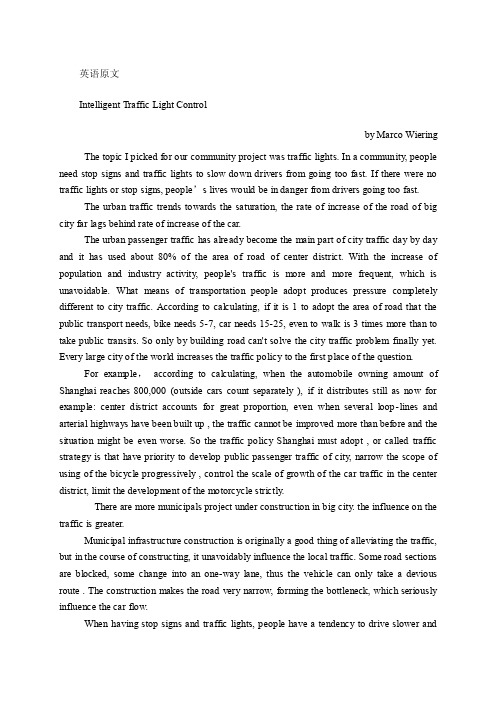
英语原文Intelligent Traffic Light Controlby Marco Wiering The topic I picked for our community project was traffic lights. In a community, people need stop signs and traffic lights to slow down drivers from going too fast. If there were no traffic lights or stop signs, people’s lives would be in danger from drivers going too fast.The urban traffic trends towards the saturation, the rate of increase of the road of big city far lags behind rate of increase of the car.The urban passenger traffic has already become the main part of city traffic day by day and it has used about 80% of the area of road of center district. With the increase of population and industry activity, people's traffic is more and more frequent, which is unavoidable. What means of transportation people adopt produces pressure completely different to city traffic. According to calculating, if it is 1 to adopt the area of road that the public transport needs, bike needs 5-7, car needs 15-25, even to walk is 3 times more than to take public transits. So only by building road can't solve the city traffic problem finally yet. Every large city of the world increases the traffic policy to the first place of the question.For example,according to calculating, when the automobile owning amount of Shanghai reaches 800,000 (outside cars count separately ), if it distributes still as now for example: center district accounts for great proportion, even when several loop-lines and arterial highways have been built up , the traffic cannot be improved more than before and the situation might be even worse. So the traffic policy Shanghai must adopt , or called traffic strategy is that have priority to develop public passenger traffic of city, narrow the scope of using of the bicycle progressively , control the scale of growth of the car traffic in the center district, limit the development of the motorcycle strictly.There are more municipals project under construction in big city. the influence on the traffic is greater.Municipal infrastructure construction is originally a good thing of alleviating the traffic, but in the course of constructing, it unavoidably influence the local traffic. Some road sections are blocked, some change into an one-way lane, thus the vehicle can only take a devious route . The construction makes the road very narrow, forming the bottleneck, which seriously influence the car flow.When having stop signs and traffic lights, people have a tendency to drive slower andlook out for people walking in the middle of streets. To put a traffic light or a stop sign in a community, it takes a lot of work and planning from the community and the city to put one in. It is not cheap to do it either. The community first needs to take a petition around to everyone in the community and have them sign so they can take it to the board when the next city council meeting is. A couple residents will present it to the board, and they will decide weather or not to put it in or not. If not put in a lot of residents might be mad and bad things could happened to that part of the city.When the planning of putting traffic lights and stop signs, you should look at the subdivision plan and figure out where all the buildings and schools are for the protection of students walking and riding home from school. In our plan that we have made, we will need traffic lights next to the school, so people will look out for the students going home. We will need a stop sign next to the park incase kids run out in the street. This will help the protection of the kids having fun. Will need a traffic light separating the mall and the store. This will be the busiest part of the town with people going to the mall and the store. And finally there will need to be a stop sign at the end of the streets so people don’t drive too fast and get in a big accident. If this is down everyone will be safe driving, walking, or riding their bikes.In putting in a traffic light, it takes a lot of planning and money to complete it. A traffic light cost around $40,000 to $125,000 and sometimes more depending on the location. If a business goes in and a traffic light needs to go in, the business or businesses will have to pay some money to pay for it to make sure everyone is safe going from and to that business. Also if there is too many accidents in one particular place in a city, a traffic light will go in to safe people from getting a severe accident and ending their life and maybe someone else’s.The reason I picked this part of our community development report was that traffic is a very important part of a city. If not for traffic lights and stop signs, people’s lives would be in danger every time they walked out their doors. People will be driving extremely fast and people will be hit just trying to have fun with their friends. So having traffic lights and stop signs this will prevent all this from happening.Traffic in a city is very much affected by traffic light controllers. When waiting for a traffic light, the driver looses time and the car uses fuel. Hence, reducing waiting times before traffic lights can save our European society billions of Euros annually. To make traffic light controllers more intelligent, we exploit the emergence of novel technologies such as communication networks and sensor networks, as well as the use of more sophisticated algorithms for setting traffic lights. Intelligent traffic light control does not only mean thattraffic lights are set in order to minimize waiting times of road users, but also that road users receive information about how to drive through a city in order to minimize their waiting times. This means that we are coping with a complex multi-agent system, where communication and coordination play essential roles. Our research has led to a novel system in which traffic light controllers and the behaviour of car drivers are optimized using machine-learning methods.Our idea of setting a traffic light is as follows. Suppose there are a number of cars with their destination address standing before a crossing. All cars communicate to the traffic light their specific place in the queue and their destination address. Now the traffic light has to decide which option (ie, which lanes are to be put on green) is optimal to minimize the long-term average waiting time until all cars have arrived at their destination address. The learning traffic light controllers solve this problem by estimating how long it would take for a car to arrive at its destination address (for which the car may need to pass many different traffic lights) when currently the light would be put on green, and how long it would take if the light would be put on red. The difference between the waiting time for red and the waiting time for green is the gain for the car. Now the traffic light controllers set the lights in such a way to maximize the average gain of all cars standing before the crossing. To estimate the waiting times, we use 'reinforcement learning' which keeps track of the waiting times of individual cars and uses a smart way to compute the long term average waiting times using dynamic programming algorithms. One nice feature is that the system is very fair; it never lets one car wait for a very long time, since then its gain of setting its own light to green becomes very large, and the optimal decision of the traffic light will set his light to green. Furthermore, since we estimate waiting times before traffic lights until the destination of the road user has been reached, the road user can use this information to choose to which next traffic light to go, thereby improving its driving behaviour through a city. Note that we solve the traffic light control problem by using a distributed multi-agent system, where cooperation and coordination are done by communication, learning, and voting mechanisms. To allow for green waves during extremely busy situations, we combine our algorithm with a special bucket algorithm which propagates gains from one traffic light to the next one, inducing stronger voting on the next traffic controller option.We have implemented the 'Green Light District', a traffic simulator in Java in which infrastructures can be edited easily by using the mouse, and different levels of road usage can be simulated. A large number of fixed and learning traffic light controllers have already been tested in the simulator and the resulting average waiting times of cars have been plotted and compared. The results indicate that the learning controllers can reduce average waiting timeswith at least 10% in semi-busy traffic situations, and even much more when high congestion of the traffic occurs.We are currently studying the behaviour of the learning traffic light controllers on many different infrastructures in our simulator. We are also planning to cooperate with other institutes and companies in the Netherlands to apply our system to real world traffic situations. For this, modern technologies such as communicating networks can be brought to use on a very large scale, making the necessary communication between road users and traffic lights possible.中文翻译:智能交通信号灯控制马克·威宁我所选择的社区项目主题是交通灯。
机械设计制造及其自动化毕业论文中英文资料外文翻译
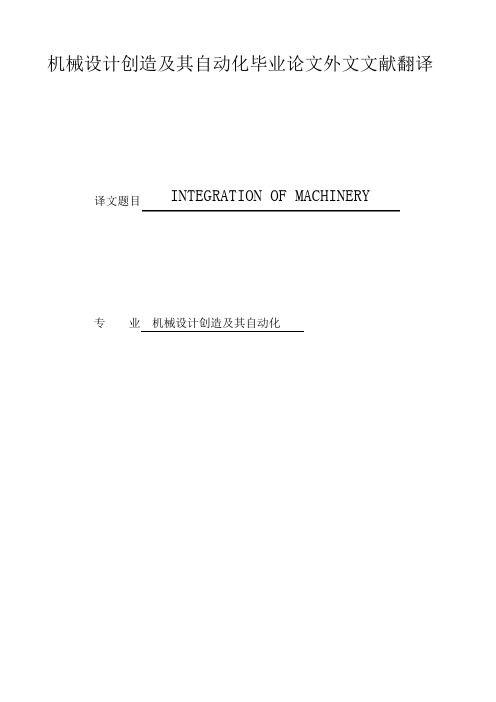
机械设计创造及其自动化毕业论文外文文献翻译INTEGRATION OF MACHINERY译文题目专业机械设计创造及其自动化外文资料翻译INTEGRATION OF MACHINERY(From ELECTRICAL AND MACHINERY INDUSTRY)ABSTRACTMachinery was the modern science and technology development inevitable result, this article has summarized the integration of machinery technology basic outline and the development background .Summarized the domestic and foreign integration of machinery technology present situation, has analyzed the integration of machinery technology trend of development.Key word: integration of machinery ,technology, present situation ,product t,echnique of manufacture ,trend of development0. Introduction modern science and technology unceasing development, impelled different discipline intersecting enormously with the seepage, has caused the project domain technological revolution and the transformation .In mechanical engineering domain, because the microelectronic technology and the computer technology rapid development and forms to the mechanical industry seepage the integration of machinery, caused the mechanical industry the technical structure, the product organization, the function and the constitution, the production method and the management systemof by machinery for the characteristic integration ofdevelopment phase.1. Integration of machinery outline integration of machinery is refers in the organization new owner function, the power function, in the information processing function and the control function introduces the electronic technology, unifies the system the mechanism and the computerization design and the software which constitutes always to call. The integration of machinery development also has become one to have until now own system new discipline, not only develops along with the science and technology, but also entrusts with the new content .But its basic characteristic may summarize is: The integration of machinery is embarks from the system viewpoint, synthesis community technologies and so on utilization mechanical technology, microelectronic technology, automatic control technology, computer technology, information technology, sensing observation and control technology, electric power electronic technology, connection technology, information conversion technology as well as software programming technology, according to the system function goal and the optimized organization goal, reasonable disposition and the layout various functions unit, in multi-purpose, high grade, redundant reliable, in the low energy consumption significance realize the specific function value, and causes the overall system optimization the systems engineering technology .From this produces functional system, then becomes an integration of machinery systematic or the integration of machinery product. Therefore, of coveringtechnology is based on the above community technology organic fusion one kind of comprehensive technology, but is not mechanical technical, the microelectronic technology as well as other new technical simple combination, pieces together .This is the integration of machinery and the machinery adds the machinery electrification which the electricity forms in the concept basic difference .The mechanical engineering technology has the merely technical to develop the machinery electrification, still was the traditional machinery, its main function still was replaces with the enlargement physical strength .But after develops the integration of machinery, micro electron installment besides may substitute for certain mechanical parts the original function, but also can entrust with many new functions,like the automatic detection, the automatic reduction information, demonstrate the record, the automatic control and the control automatic diagnosis and the protection automatically and so on .Not only namely the integration of machinery product is human's hand and body extending, human's sense organ and the brains look, has the intellectualized characteristic is the integration of machinery and the machinery electrification distinguishes in the function essence.2. Integration of machinery development condition integration of machinery development may divide into 3 stages roughly.20th century 60's before for the first stage, this stage is called the initial stage .In this time, the people determination not on own initiative uses the electronic technology the preliminary achievement to consummate the mechanical product the performance .Specially in Second World War period, the war has stimulated the mechanical product and the electronic technology union, these mechanical and electrical union military technology, postwar transfers civilly, to postwar economical restoration positive function .Developed and the development at that time generally speaking also is at the spontaneouscondition .Because at that time the electronic technology development not yet achieved certain level, mechanical technical and electronic technology union also not impossible widespread and thorough development, already developed the product was also unable to promote massively. The 20th century 70~80 ages for the second stage, may be called the vigorous development stage .This time, the computer technology, the control technology, the communication development, has laid the technology base for the integration of machinery development . Large-scale, ultra large scale integrated circuit and microcomputer swift and violent development, has provided the full material base for the integration of machinery development .This time characteristic is :①A mechatronics word first generally is accepted in Japan, probably obtains the quite widespread acknowledgment to 1980s last stages in the worldwide scale ;②The integration of machinery technology and the product obtained the enormous development ;③The various countries start to the integration of machinery technology and the product give the very big attention and the support. 1990s later periods, started the integration of machinery technology the new stagewhich makes great strides forward to the intellectualized direction, the integration of machinery enters the thorough development time .At the same time, optics, the communication and so on entered the integration of machinery, processes the technology also zhan to appear tiny in the integration of machinery the foot, appeared the light integration of machinery and the micro integration of machinery and so on the new branch; On the other hand to the integration of machinery system modeling design, the analysis and the integrated method, the integration of machinery discipline system and the trend of development has all conducted the thorough research .At the same time, because the hugeprogress which domains and so on artificial intelligence technology, neural network technology and optical fiber technology obtain, opened the development vast world for the integration of machinery technology .These research, will urge the integration of machinery further to establish the integrity the foundation and forms the integrity gradually the scientific system. Our country is only then starts from the beginning of 1980s in this aspect to study with the application .The State Councilsummary had considered fully on international the influence which and possibly brought from this about the integration of machinery technology developmenttrend .Many universities, colleges and institutes, the development facility and some large and middle scale enterprises have done the massive work to this technical development and the application, does not yield certain result, but and so on the advanced countries compared with Japan still has the suitable disparity.3. Integration of machinery trend of development integrations of machinery are the collection machinery, the electron, optics, the control, the computer, the information and so on the multi-disciplinary overlapping syntheses, its development and the progress rely on and promote the correlation technology development and the progress .Therefore, the integration of machinery main development direction is as follows:3.1 Intellectualized intellectualizations are 21st century integration of machinery technological development important development directions .Theartificial intelligence obtains day by day in the integration of machinery constructor's research takes, the robot and the numerical control engine bedis to the machine behavior description, is in the control theory foundation, the absorption artificial intelligence, the operations research, the computer science, the fuzzy mathematics, the psychology, the physiology and the chaos dynamics and so on the new thought, the new method, simulate the human intelligence, enable it to have abilities and so on judgment inference, logical thinking, independent decision-making, obtains the higher control goal in order to .Indeed, enable the integration of machinery product to have with the human identical intelligence, is not impossible, also is nonessential .But, the high performance, the high speed microprocessor enable the integration of machinery product to have preliminary intelligent or human's partial intelligences, then is completely possible and essential.In the modern manufacture process, the information has become the control manufacture industry the determining factor, moreover is the most active actuation factor .Enhances the manufacture system information-handling capacity to become the modern manufacture science development a key point .As a result of the manufacture system information organization and structure multi-level, makes the information the gain, the integration and the fusion presents draws up the character, information measure multi-dimensional, as well as information organization's multi-level .In the manufacture information structural model, manufacture information uniform restraint, dissemination processing and magnanimous data aspects and so on manufacture knowledge library management, all also wait for further break through.Each kind of artificial intelligence tool and the computation intelligence method promoted the manufacture intelligence development in the manufacture widespread application .A kind based on the biological evolution algorithm computation intelligent agent, in includes thescheduling problem in the combination optimization solution area of technology, receives the more and more universal attention, hopefully completes the combination optimization question when the manufacture the solution speed and the solution precision aspect breaks through the question scale in pairs the restriction .The manufacture intelligence also displays in: The intelligent dispatch, the intelligent design, the intelligent processing, the robot study, the intelligent control, the intelligent craft plan, the intelligent diagnosis and so on are various These question key breakthrough, may form the product innovation the basic research system. Between 2 modern mechanical engineering front science different science overlapping fusion will have the new science accumulation, the economical development and society's progress has had the new request and the expectation to the science and technology, thus will form the front science .The front science also has solved and between the solution scientific question border area .The front science has the obvious time domain, the domain and the dynamic characteristic .The project front science distinguished in the general basic science important characteristic is it has covered the key science and technology question which the project actual appeared.Manufacture system is a complex large-scale system, for satisfies the manufacture system agility, the fast response and fast reorganization ability, must profit from the information science, the life sciences and the social sciences and so on the multi-disciplinary research results, the exploration manufacture system new architecture, the manufacture pattern and the manufacture system effective operational mechanism .Makes the system optimization the organizational structure and the good movement condition is makes the system modeling , the simulation and the optimized essential target .Not only the manufacture system new architecture to makes the enterprise the agility and may reorganize ability to the demand response ability to have the vital significance, moreover to made the enterprise first floor production equipment the flexibility and may dynamic reorganization ability set a higher request .The biological manufacture view more and more many is introduced the manufacture system, satisfies the manufacture system new request.The study organizes and circulates method and technique of complicated system from the biological phenomenon, is a valid exit which will solve many hard nut to cracks that manufacturing industry face from now on currently .Imitating to living what manufacturing point is mimicry living creature organ of from the organization, from match more, from growth with from evolution etc. function structure and circulate mode of a kind of manufacturing system and manufacturing process.The manufacturing drives in the mechanism under, continuously by one's own perfect raise on organizing structure and circulating mode and thus to adapt the process of[with] ability for the environment .For from descend but the last product proceed together a design and make a craft rules the auto of the distance born, produce system of dynamic state reorganization and product and manufacturing the system tend automatically excellent provided theories foundation and carry out acondition .Imitate to living a manufacturing to belong to manufacturing science and life science of"the far good luck is miscellaneous to hand over", it will produce to the manufacturing industry for 21 centuries huge of influence .机电一体化摘要机电一体化是现代科学技术发展的必然结果,本文简述了机电一体化技术的基本概要和发展背景。
本科毕业设计(论文)外文翻译译文
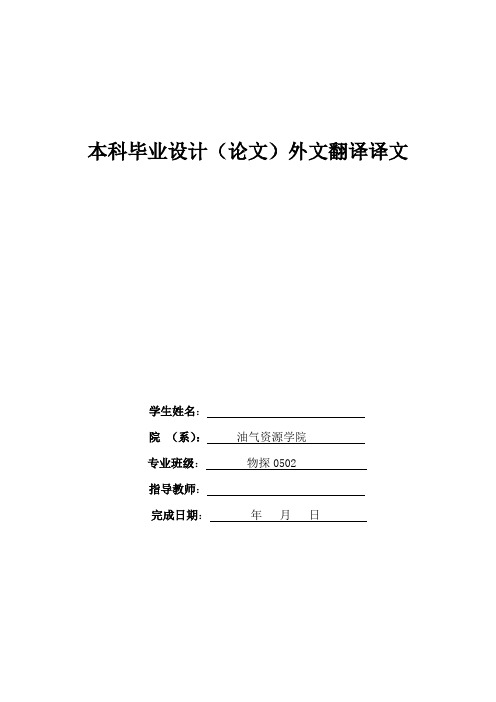
本科毕业设计(论文)外文翻译译文学生姓名:院(系):油气资源学院专业班级:物探0502指导教师:完成日期:年月日地震驱动评价与发展:以玻利维亚冲积盆地的研究为例起止页码:1099——1108出版日期:NOVEMBER 2005THE LEADING EDGE出版单位:PanYAmericanYEnergyvBuenosYAiresvYArgentinaJPYBLANGYvYBPYExplorationvYHoustonvYUSAJ.C.YCORDOVAandYE.YMARTINEZvYChacoYS.A.vYSantaYCruzvYBolivia 通过整合多种地球物理地质技术,在玻利维亚冲积盆地,我们可以减少许多与白垩纪储集层勘探有关的地质技术风险。
通过对这些远景区进行成功钻探我们可以验证我们的解释。
这些方法包括盆地模拟,联井及地震叠前同时反演,岩石性质及地震属性解释,A VO/A V A,水平地震同相轴,光谱分解。
联合解释能够得到构造和沉积模式的微笑校正。
迄今为止,在新区有七口井已经进行了成功钻探。
基质和区域地质。
Tarija/Chaco盆地的subandean 褶皱和冲断带山麓的中部和南部,部分扩展到玻利维亚的Boomerange地区经历了集中的成功的开采。
许多深大的泥盆纪气田已经被发现,目前正在生产。
另外在山麓发现的规模较小较浅的天然气和凝析气田和大的油田进行价格竞争,如果他们能产出较快的油流而且成本低。
最近发现气田就是这种情况。
接下来,我们赋予Aguja的虚假名字就是为了讲述这些油田的成功例子。
图1 Aguja油田位于玻利维亚中部Chaco盆地的西北角。
基底构造图显示了Isarzama背斜的相对位置。
地层柱状图显示了主要的储集层和源岩。
该油田在Trija和冲积盆地附近的益背斜基底上,该背斜将油田和Ben i盆地分开(图1),圈闭类型是上盘背斜,它存在于连续冲断层上,Aguja有两个主要结构:Aguja中部和Aguja Norte,通过重要的转换压缩断层将较早开发的“Sur”油田分开Yantata Centro结构是一个三路闭合对低角度逆冲断层并伴随有小的摆幅。
薪酬管理毕业论文外文翻译资料
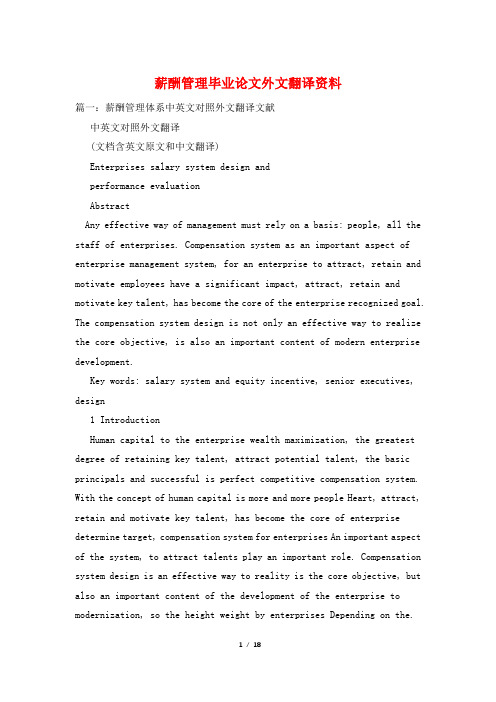
薪酬管理毕业论文外文翻译资料篇一:薪酬管理体系中英文对照外文翻译文献中英文对照外文翻译(文档含英文原文和中文翻译)Enterprises salary system design andperformance evaluationAbstractAny effective way of management must rely on a basis: people, all the staff of enterprises. Compensation system as an important aspect of enterprise management system, for an enterprise to attract, retain and motivate employees have a significant impact, attract, retain and motivate key talent, has become the core of the enterprise recognized goal. The compensation system design is not only an effective way to realize the core objective, is also an important content of modern enterprise development.Key words: salary system and equity incentive, senior executives, design1 IntroductionHuman capital to the enterprise wealth maximization, the greatest degree of retaining key talent, attract potential talent, the basic principals and successful is perfect competitive compensation system. With the concept of human capital is more and more people Heart, attract, retain and motivate key talent, has become the core of enterprise determine target, compensation system for enterprises An important aspect of the system, to attract talents play an important role. Compensation system design is an effective way to reality is the core objective, but also an important content of the development of the enterprise to modernization, so the height weight by enterprises Depending on the.2 Literature reviewEarly in the traditional compensation phase, the employers always minimize workers to cut costs as much as possible, and through this method make the Labor of workers have to work harder in order to get paid enough to make a living. William. First, Quesnay’s minimum wage theory is that wages and other commodities, there is a natural value, namely maintain staff minimum standard of living life information value,the minimum wage for workers does not depend on the enterprise or the employer s subjective desire, but the result of the competition in the market. The classical economists Muller believed that certain conditions, the total capital in the enterprise salary depends on the labor force and for the purchase of labor relationship between capital and other capital; For the payment of capital wage fund is difficult to change in the short term. Wages fund quantity depends on two factors: one is a worker, directly or indirectly, in the production of products and services production efficiency; the other one is in the process of production of these goods directly or indirectly employ labor quantity. With the development of era, the simple forms of employment have already can t satisfy the demand of the workers, so some interests to share views was put forward to motivate workers. On this basis, the Gantt invented the complete tasks rewarded system to perfect the incentive measures. Represented by Americaneconomist Becker’s theory of human capital school of thought argues that human capital is determined by the human capital investment, is present in the human body to the content of knowledge, skills, etc. Martin Weizmann share of economic theory that wages should be linked to corporate profits. Increase in profits, employee wages fund, increased profits, and employee wages fund. Between enterprises and employees is the key of the labor contract is not in a fixed wage of how many, but in the division of labor both sides share proportion. In modern compensation phase, thecontents of the compensation has been changed, increased a lot of different compensation models, and more and more pay attention to employee s personal feelings and development, employees can even according to individual condition choose different salary portfolio model. Employees can be paid off on surface of the material and spiritual.3 Pay system overviewIn the past the traditional pay system, usually are business owners value orientation as the guide to carry on the design. With the continuous development of the overall market environment, in the modern enterprise management concept has also changed. They are aware of the established compensation system should adapt to the employee benefit as a starting point, the self-interest pursuit and employee demand together, to establish a set of enterprises and employees to maximize the interests of the two-way, so as to achieve win-win situation. Since the 90 s, the westerndeveloped economies in the enterprise owners and managers try to change the traditional form of compensation, relocation compensation system, the importance of also constantly try to innovate salary system of design and diversification.Performance pay system is established in accordance with the enterprise organization structure based on the results of the individual or team performance appraisal for salary distribution system. Total compensation is generally associated with individual or team performance. Now the enterprise model is used to combine individual performance and team performance. At the same time will be long term incentive and short-term incentive flexible model. In this kind of pay structure, contains a variety of forms of performance pay.Skill-based pay system on the basis of employees skill determine employee wages level, and to the improvement of skills as their employeesprogress criteria. The compensation model can encourage employees to continuously learn new knowledge, to keep up with The Times, is the industry leader, when technology and equipment upgrades to the fastest response time to complete the change, and is helpful to form the learning corporate culture. If for flat organization structure, management jobs and opportunities for advancement are less, the compensation system can be very skillful professionals to make up for in terms of compensation. But with technical compensation system with the篇二:薪酬外文文献毕业论文材料:英文文献及译文课题名称:薪酬体系专业工商管理学生姓名班级 B 工商 072学号指导教师专业系主任完成日期二零一一年三月The Changing Pattern of Pay and BenefitsTudor, Thomas R, Trumble, Robert RJournal of Compensation Benefits/May/2008Today, many companies still base their reward systems on the 1950s compensation model made popular during the brief period when U.S. companies dominated the world. With todays increasingly competitive environment, however, companies must look more closely at thecost-benefit of rewards, instead of just using them in an attempt to reduce employee dissatisfaction. Companies must provide short-term motivation and encourage employees to develop long-term skills that will aid the company. Most importantly, companies must also attract and retain highperformers, instead of alienating them with pay systems that give everyone pay increases without regard to levels of performance. For example, such new compensation approaches may include skill-based pay, gainsharing plans, and flexible benefits systems.Traditional compensation approaches are still often modeled on the centralization-based organizational model, in which decisions were made at the top and management rigidly defined tasks. However, with global competition becoming an increasingly prominent issue, companies need reward systems that match their movement to decentralized structures. Larger numbers of companies are also becoming very aware that they cannot just pass additional compensation costs onto future customers. Today, our pay systems must move in step with the participative-management trend by becoming more flexible instead of remaining fixed. This adjustment involves many factors including shorter product life cycles, a need to be more flexible, a need for workers to continually gain additional skills, and for them to think more on the job.In today s most successful companies, employee rewards and benefits are increasingly incorporated into an organization s strategic planning. Why? The rationale is that employee compensation has a substantial impact on the long-term financial position of a firm. Compensation structures should consider an organization s strategic requirements and should match organizational goals. Compensation strategic planning shouldinvolve:consideration of the internal and external environment; and creation of an organization s compensation statement, compensation goals, and the development of compensation policies.Today, one strategic compensation trend is the use of pay incentives instead of the traditional, annual “everybody gets” pay increase. The rationale is to control costs and to more closely tie performance to compensation. We can group the changing pattern of compensation into twogeneral areas: Pay Method Trends and Benefits Trends. Human Resources managers should familiarize themselves with these changing trends and determine the plan that is most suitable for their organization.PAY METHOD TRENDSThere are a number of pay methods available for use by employers, including general pay increases, cost-of-living increases, merit pay, bonuses, skill-based pay, competence-based pay, CEO compensation, gainsharing, and various types of incentive pay.General Pay IncreaseA general pay increase is a pay increase given to everyone in a company. It can be a lump-sum payment, but it is more likely to be a percentage increase in base salary. The employer s rationale for the pay increase may have been the result of a market survey, job evaluation, or just a profitable year. The trend, however, is for general increases to decline as pay-for-performance systems become increasingly dominant. In addition, giving everyone the same raise sometimes decreases morale becausehigh-performing employees see poor performers getting the same reward. Cost-of-Living IncreaseCost-of-living increases are general pay increases triggered by a rise in an inflation-sensitive index, such as the consumer price index or the producer price index. As with general pay increases, the use ofcost-of-living pay increases is decreasing among companies. The rationale for this decrease is that with lower inflation (thus little change in prices), incomes are more stable and the need for inflation adjustments is not as great as it was in the past. In addition, collective bargaining agreements are now less likely to include provisions for cost-of-living increases, so nonunion firms are not under as much pressure to provide them in an attempt to match union-negotiated compensation. Their declinecan also be attributed to the fact that employers are moving away from pay systems that are nonperformance related.Merit PayMerit pay is another generic term in which pay incentives are given for overall job performance.2 Some problems frequently encountered with merit pay plans include:? the use of subjective criteria when measuring employee performance; ? a lack of uniform standards for rating individual employees;? differences among managers in how to make individual ratings.Merit pay was the first attempt by firms to create apay-for-performance system. However, due to employer (and employee) dissatisfaction with merit pay plans, the trend is to eliminate them and instead use pay-for-performance plans that are more objective (such as bonus plans), and that use specific performance measuring criteria that aid in the performance appraisal process.3 This trend includes both the private and public sectors, because the merit pay system in the federal sector has also been inadequate.BonusA bonus is a generic term involving a type of pay-for-performance plan. Managers can give a bonus for individual or group performance, and for meeting objectives such as MBO (management by objectives). Researchers and practitioners have given these plans high marks for motivating employees, for creating loyalty, and for meeting performance objectives. In addition, bonuses reduce the turnover of high-performing employees and increase the turnover of low performers, who do not get bonuses. If the bonus system is well-designed, they also create internal equity. As such, bonus systems (pay-for-performance) are the current trend in compensation.Skill-Based PaySkill-based pay emphasizes a company s desire to increase the skills and knowledge of its workforce. It may involve classes, voluntary job rotation, or tests. Itsbenefits are many, including having trained people available to do a job if someone is absent. Skill-based pay also works well with quality circles because:? it provides employees with a better understanding of the jobs their coworkers perform;? it reduces resistance to restructuring or other needed changes; ? it leads to a more flexibleworkforce that can better adapt to new technologies or processes; and it encourages a learning environment.It does, however, require a large investment in training which can be expensive.Competence-Based PayCompetence-based pay (the grid system) is very new and does vary from plan-to-plan. The idea is not only to reward employees for how well they do a job, but for how they do the job. For example, a competence-based pay plan can be used to persuade workers to use the computers that are sitting on their desks, or to adapt to other changes that come along. The rationale behind a competence-based pay plan is to keep employee skills current.CEO CompensationThe compensation of CEOs (and other top executives) has also been changing, and now includes more pay incentives—such as stock options —to better link performance with compensation. Plans linking executive pay with performance may include stock options, cash bonuses, phantom stock, or deferred compensation, all of which are ways of making top management more accountable for company performance. Today, performance considerations are a larger part of executive compensation. TheSecurities and Exchange Commission also requires corporations to explain the rationale behind their executive compensation programs to shareholders.GainsharingGainsharing is a pay-for-performance plan in which “gains” are shared with employees for improvements in profitability orproductivity.Gainsharing plans are designed to create a partnership with employees so that both management and labor are working toward the same goals and that both groups are benefiting from the results. Gainsharing is a growing trend, and it fits well with other trends, such as participatory management, worker empowerment, and teamwork. It is also being used in many service businesses, such as banking and insurance. Gainsharing encourages employee involvement and acceptance of change, and aligns employee goals with company goals.Five Types of Pay IncentivesWhile all pay incentives can be generically coined as “gainsharing,”we will briefly mention five types:1. ESOPs. Employee Stock Ownership Plans allow the sharing of gains throughdividends and any increase in the value of company stock. ESOPs do create ownership in the company for employees that may result in additional motivation, but they do not necessarily have aparticipative-management component.2. Profit-Sharing Plans. Profit-sharing plans allow employees to share in the revenue they helped generate. This sharing can be either deferred or immediate. Some observers argue that associating rewards and performance is difficult if managersonly give rewards annually, and that perhaps employees should not share in the profits because they do not share in the risks. However, companiessuch as Lincoln Electric and Ford feel that profit sharing is a strong inducement to increase performance. The current rate of growth of these plans is significant. For best motivational results, companies should use a system that is based on some criteria that employees understand, instead of just an arbitrary amount. The advantage of profitsharing plans is that employers do not have to pay a large sum of money if the profit target is not met.3. Scanlon Plans. Scanlon plans allow employees to share in any savings in laborcost (using a ratio) that is due to their increased performance. The rationale for ScanIon plans is to help employees identify with and participate in the company. Employees participating in such plans may have access to suggestion programs, brainstorming sessions, or committees to solve production problems. The employer and the employees then share in the savings that result.4. Rucker Plans. Rucker plans allow employees to share in any improvement in theratio of employee costs to the valued added in manufacturing. This is the most complex gainsharing plan, because it deals with four variables: labor costs, sales value of production (changes in equipment, or work methods, for example), purchases of outside services such as subcontracting, or utilities, and purchases of outside materials, involving “inventory, theft, and so on”. Rucker plans are designed to give employees a stake in areas such as reducing labor costs, using raw materials, and outsourcing decisions. As such, everyone shares in the savings.5. Improshare Plans. Improshare plans allow employees to share in productivitygains that occur because of their efforts.[sup5] Following the Improshare approach, managers give bonuses when the actual hours for a specific amount of productivity are less than the standard that they created using a formula. The savings are split between the company and the workers, in a ratio such as 50?50. CHANGES IN BENEFIT PLANSChanges in benefit plans have occurred as a result of efforts to keep up with trends, to contain costs, and to meet government regulations. Employees often view benefits as an entitlement, and their cost—which has steadily increased—now averages 36 percent of total wages. The trend is to get the most out of benefits, while keeping costs down. For example, employers do not want to pay for any overlap of coverage, or to pay too much for coverage. As their costs continue to go up, employers are now starting to question how much employees value their benefits. For example: ? Do they support recruitment, motivate, and retain good employees? ? Do they support the strategic mission of the firm?? Do proposed benefits support the company s retention goals and the demographics of potential recruits?? Do they support the company culture or the culture the company now wants to promote? A movement now exists among employers for measuring benefit results and continuously evaluating benefits. A focus on Total Quality Management makes the internal employee the customer of HR departments who have the product of “benefits.” HR departments want to satisfy the篇三:企业薪酬管理外文翻译文献企业薪酬管理外文翻译文献(文档含英文原文和中文翻译)翻译:宽带薪酬体系——薪酬模式的创新视野摘要:最近,有关“企业人力资源管理中的有效激励”的问题吸引了许多产业界和学术界的学者的关注。
毕业论文翻译稿件【范本模板】
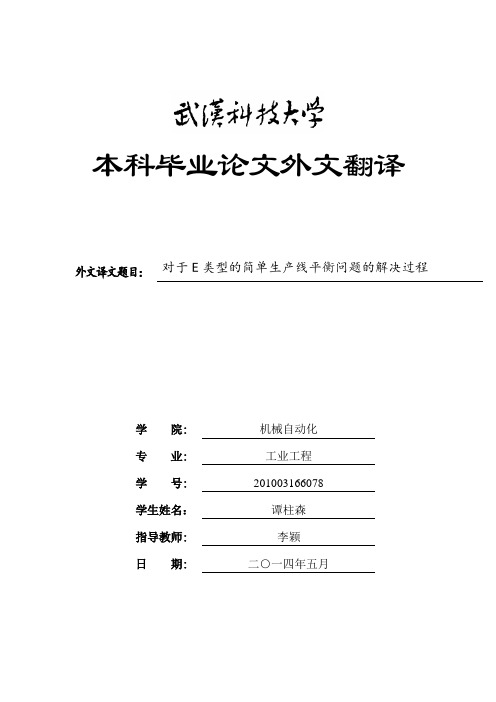
本科毕业论文外文翻译外文译文题目:对于E类型的简单生产线平衡问题的解决过程学院: 机械自动化专业: 工业工程学号: 201003166078学生姓名:谭柱森指导教师: 李颖日期: 二○一四年五月A solution procedure for type E simple assembly linebalancing problemNai—Chieh Wei , I-Ming ChaoIndustrial Engineering and Management,I—Shou University,No. 1,Section 1, Syuecheng Rd. Dashu District, KaohsiungCity 84001,Taiwan, ROC.对于E类型的简单生产线平衡问题的解决过程Nai-Chieh Wei , I-Ming Chao工业工程与管理,中华人民共和国,台湾省,高雄市,Syuecheng Rd。
Dashu街一号,义守大学,第一章第一节摘要本文提出了结合SALBP—1和SALBP-2的E型简单装配线平衡问题(SALBP—E),更多的,本研究为提出的模型提供了解决方法。
提出的模型在最小化空闲时间的同时优化装配线平衡率,为管理实践提供了更好的理解,计算结果表明:给出周期的上限ct以后,提出的模型可以最优的解决问题,因为它含有最少的变量,约max束和计算时间。
1前言从研究者第一次讨论装配线平衡问题以来,大约有50年了,在众多有关生产线平衡问题中,最基本的是简单装配线平衡问题,早在1954年,Bryton就定义并且研究了生产线平衡问题。
后一年,Salverson建立了第一个生产线平衡的数学模型并提出了定性的解决步骤,这引来了很大的兴趣,在Gutjahr 和Nemhauser说明生产线平衡是一种NP组合优化难题,大多数研究者希望开发一种能高效解决多种装配线问题的方法。
在随后的几年,生产线平衡成为了一个流行的主题,Kim,Kim,and Kim (1996)把生产线平衡分为五类问题,其中的问题1(SALBP —1)和问题Ⅱ(SALBP—Ⅱ)是两种基本的优化问题。
土木工程毕业论文中英文翻译
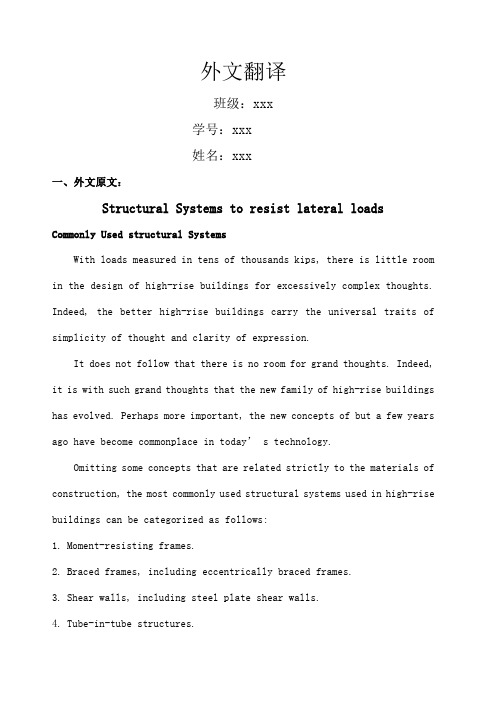
外文翻译班级:xxx学号:xxx姓名:xxx一、外文原文:Structural Systems to resist lateral loads Commonly Used structural SystemsWith loads measured in tens of thousands kips, there is little room in the design of high-rise buildings for excessively complex thoughts. Indeed, the better high-rise buildings carry the universal traits of simplicity of thought and clarity of expression.It does not follow that there is no room for grand thoughts. Indeed, it is with such grand thoughts that the new family of high-rise buildings has evolved. Perhaps more important, the new concepts of but a few years ago have become commonplace in today’ s technology.Omitting some concepts that are related strictly to the materials of construction, the most commonly used structural systems used in high-rise buildings can be categorized as follows:1.Moment-resisting frames.2.Braced frames, including eccentrically braced frames.3.Shear walls, including steel plate shear walls.4.Tube-in-tube structures.5.Core-interactive structures.6.Cellular or bundled-tube systems.Particularly with the recent trend toward more complex forms, but in response also to the need for increased stiffness to resist the forces from wind and earthquake, most high-rise buildings have structural systems built up of combinations of frames, braced bents, shear walls, and related systems. Further, for the taller buildings, the majorities are composed of interactive elements in three-dimensional arrays.The method of combining these elements is the very essence of the design process for high-rise buildings. These combinations need evolve in response to environmental, functional, and cost considerations so as to provide efficient structures that provoke the architectural development to new heights. This is not to say that imaginative structural design can create great architecture. To the contrary, many examples of fine architecture have been created with only moderate support from the structural engineer, while only fine structure, not great architecture, can be developed without the genius and the leadership of a talented architect. In any event, the best of both is needed to formulate a truly extraordinary design of a high-rise building.While comprehensive discussions of these seven systems are generally available in the literature, further discussion is warranted here .The essence of the design process is distributed throughout the discussion.Moment-Resisting FramesPerhaps the most commonly used system in low-to medium-rise buildings, the moment-resisting frame, is characterized by linear horizontal and vertical members connected essentially rigidly at their joints. Such frames are used as a stand-alone system or in combination with other systems so as to provide the needed resistance to horizontal loads. In the taller of high-rise buildings, the system is likely to be found inappropriate for a stand-alone system, this because of the difficulty in mobilizing sufficient stiffness under lateral forces.Analysis can be accomplished by STRESS, STRUDL, or a host of other appropriate computer programs; analysis by the so-called portal method of the cantilever method has no place in today’s technology.Because of the intrinsic flexibility of the column/girder intersection, and because preliminary designs should aim to highlight weaknesses of systems, it is not unusual to use center-to-center dimensions for the frame in the preliminary analysis. Of course, in the latter phases of design, a realistic appraisal in-joint deformation is essential.Braced Frame sThe braced frame, intrinsically stiffer than the moment –resisting frame, finds also greater application to higher-rise buildings. The system is characterized by linear horizontal, vertical, and diagonal members, connected simply or rigidly at their joints. It is used commonly inconjunction with other systems for taller buildings and as a stand-alone system in low-to medium-rise buildings.While the use of structural steel in braced frames is common, concrete frames are more likely to be of the larger-scale variety.Of special interest in areas of high seismicity is the use of the eccentric braced frame.Again, analysis can be by STRESS, STRUDL, or any one of a series of two –or three dimensional analysis computer programs. And again, center-to-center dimensions are used commonly in the preliminary analysis. Shear wallsThe shear wall is yet another step forward along a progression of ever-stiffer structural systems. The system is characterized by relatively thin, generally but not always concrete elements that provide both structural strength and separation between building functions.In high-rise buildings, shear wall systems tend to have a relatively high aspect ratio, that is, their height tends to be large compared to their width. Lacking tension in the foundation system, any structural element is limited in its ability to resist overturning moment by the width of the system and by the gravity load supported by the element. Limited to a narrow overturning, One obvious use of the system, which does have the needed width, is in the exterior walls of building, where the requirement for windows is kept small.Structural steel shear walls, generally stiffened against buckling by a concrete overlay, have found application where shear loads are high. The system, intrinsically more economical than steel bracing, is particularly effective in carrying shear loads down through the taller floors in the areas immediately above grade. The system has the further advantage of having high ductility a feature of particular importance in areas of high seismicity.The analysis of shear wall systems is made complex because of the inevitable presence of large openings through these walls. Preliminary analysis can be by truss-analogy, by the finite element method, or by making use of a proprietary computer program designed to consider the interaction, or coupling, of shear walls.Framed or Braced TubesThe concept of the framed or braced or braced tube erupted into the technology with the IBM Building in Pittsburgh, but was followed immediately with the twin 110-story towers of the World Trade Center, New York and a number of other buildings .The system is characterized by three –dimensional frames, braced frames, or shear walls, forming a closed surface more or less cylindrical in nature, but of nearly any plan configuration. Because those columns that resist lateral forces are placed as far as possible from the cancroids of the system, the overall moment of inertia is increased and stiffness is very high.The analysis of tubular structures is done using three-dimensional concepts, or by two- dimensional analogy, where possible, whichever method is used, it must be capable of accounting for the effects of shear lag.The presence of shear lag, detected first in aircraft structures, is a serious limitation in the stiffness of framed tubes. The concept has limited recent applications of framed tubes to the shear of 60 stories. Designers have developed various techniques for reducing the effects of shear lag, most noticeably the use of belt trusses. This system finds application in buildings perhaps 40stories and higher. However, except for possible aesthetic considerations, belt trusses interfere with nearly every building function associated with the outside wall; the trusses are placed often at mechanical floors, mush to the disapproval of the designers of the mechanical systems. Nevertheless, as a cost-effective structural system, the belt truss works well and will likely find continued approval from designers. Numerous studies have sought to optimize the location of these trusses, with the optimum location very dependent on the number of trusses provided. Experience would indicate, however, that the location of these trusses is provided by the optimization of mechanical systems and by aesthetic considerations, as the economics of the structural system is not highly sensitive to belt truss location.Tube-in-Tube StructuresThe tubular framing system mobilizes every column in the exterior wallin resisting over-turning and shearing forces. The term‘tube-in-tube’is largely self-explanatory in that a second ring of columns, the ring surrounding the central service core of the building, is used as an inner framed or braced tube. The purpose of the second tube is to increase resistance to over turning and to increase lateral stiffness. The tubes need not be of the same character; that is, one tube could be framed, while the other could be braced.In considering this system, is important to understand clearly the difference between the shear and the flexural components of deflection, the terms being taken from beam analogy. In a framed tube, the shear component of deflection is associated with the bending deformation of columns and girders , the webs of the framed tube while the flexural component is associated with the axial shortening and lengthening of columns , the flanges of the framed tube. In a braced tube, the shear component of deflection is associated with the axial deformation of diagonals while the flexural component of deflection is associated with the axial shortening and lengthening of columns.Following beam analogy, if plane surfaces remain plane , the floor slabs,then axial stresses in the columns of the outer tube, being farther form the neutral axis, will be substantially larger than the axial stresses in the inner tube. However, in the tube-in-tube design, when optimized, the axial stresses in the inner ring of columns may be as high, or evenhigher, than the axial stresses in the outer ring. This seeming anomaly is associated with differences in the shearing component of stiffness between the two systems. This is easiest to under-stand where the inner tube is conceived as a braced , shear-stiff tube while the outer tube is conceived as a framed , shear-flexible tube.Core Interactive StructuresCore interactive structures are a special case of a tube-in-tube wherein the two tubes are coupled together with some form of three-dimensional space frame. Indeed, the system is used often wherein the shear stiffness of the outer tube is zero. The United States Steel Building, Pittsburgh, illustrates the system very well. Here, the inner tube is a braced frame, the outer tube has no shear stiffness, and the two systems are coupled if they were considered as systems passing in a straight line from the “hat” structure. Note that the exterior columns would be improperly modeled if they were considered as systems passing in a straight line from the “hat” to the foundations; these columns are perhaps 15% stiffer as they follow the elastic curve of the braced core. Note also that the axial forces associated with the lateral forces in the inner columns change from tension to compression over the height of the tube, with the inflection point at about 5/8 of the height of the tube. The outer columns, of course, carry the same axial force under lateral load for the full height of the columns because the columns because the shearstiffness of the system is close to zero.The space structures of outrigger girders or trusses, that connect the inner tube to the outer tube, are located often at several levels in the building. The AT&T headquarters is an example of an astonishing array of interactive elements:1.The structural system is 94 ft wide, 196ft long, and 601ft high.2.Two inner tubes are provided, each 31ft by 40 ft , centered 90 ft apartin the long direction of the building.3.The inner tubes are braced in the short direction, but with zero shearstiffness in the long direction.4.A single outer tube is supplied, which encircles the buildingperimeter.5.The outer tube is a moment-resisting frame, but with zero shearstiffness for the center50ft of each of the long sides.6.A space-truss hat structure is provided at the top of the building.7.A similar space truss is located near the bottom of the building8.The entire assembly is laterally supported at the base on twinsteel-plate tubes, because the shear stiffness of the outer tube goes to zero at the base of the building.Cellular structuresA classic example of a cellular structure is the Sears Tower, Chicago,a bundled tube structure of nine separate tubes. While the Sears Towercontains nine nearly identical tubes, the basic structural system has special application for buildings of irregular shape, as the several tubes need not be similar in plan shape, It is not uncommon that some of the individual tubes one of the strengths and one of the weaknesses of the system.This special weakness of this system, particularly in framed tubes, has to do with the concept of differential column shortening. The shortening of a column under load is given by the expression△=ΣfL/EFor buildings of 12 ft floor-to-floor distances and an average compressive stress of 15 ksi 138MPa, the shortening of a column under load is 15 1212/29,000 or per story. At 50 stories, the column will have shortened to in. 94mm less than its unstressed length. Where one cell of a bundled tube system is, say, 50stories high and an adjacent cell is, say, 100stories high, those columns near the boundary between .the two systems need to have this differential deflection reconciled.Major structural work has been found to be needed at such locations. In at least one building, the Rialto Project, Melbourne, the structural engineer found it necessary to vertically pre-stress the lower height columns so as to reconcile the differential deflections of columns in close proximity with the post-tensioning of the shorter column simulatingthe weight to be added on to adjacent, higher columns.二、原文翻译:抗侧向荷载的结构体系常用的结构体系若已测出荷载量达数千万磅重,那么在高层建筑设计中就没有多少可以进行极其复杂的构思余地了;确实,较好的高层建筑普遍具有构思简单、表现明晰的特点;这并不是说没有进行宏观构思的余地;实际上,正是因为有了这种宏观的构思,新奇的高层建筑体系才得以发展,可能更重要的是:几年以前才出现的一些新概念在今天的技术中已经变得平常了;如果忽略一些与建筑材料密切相关的概念不谈,高层建筑里最为常用的结构体系便可分为如下几类:1.抗弯矩框架;2.支撑框架,包括偏心支撑框架;3.剪力墙,包括钢板剪力墙;4.筒中框架;5.筒中筒结构;6.核心交互结构;7.框格体系或束筒体系;特别是由于最近趋向于更复杂的建筑形式,同时也需要增加刚度以抵抗几力和地震力,大多数高层建筑都具有由框架、支撑构架、剪力墙和相关体系相结合而构成的体系;而且,就较高的建筑物而言,大多数都是由交互式构件组成三维陈列;将这些构件结合起来的方法正是高层建筑设计方法的本质;其结合方式需要在考虑环境、功能和费用后再发展,以便提供促使建筑发展达到新高度的有效结构;这并不是说富于想象力的结构设计就能够创造出伟大建筑;正相反,有许多例优美的建筑仅得到结构工程师适当的支持就被创造出来了,然而,如果没有天赋甚厚的建筑师的创造力的指导,那么,得以发展的就只能是好的结构,并非是伟大的建筑;无论如何,要想创造出高层建筑真正非凡的设计,两者都需要最好的;虽然在文献中通常可以见到有关这七种体系的全面性讨论,但是在这里还值得进一步讨论;设计方法的本质贯穿于整个讨论;设计方法的本质贯穿于整个讨论中;抗弯矩框架抗弯矩框架也许是低,中高度的建筑中常用的体系,它具有线性水平构件和垂直构件在接头处基本刚接之特点;这种框架用作独立的体系,或者和其他体系结合起来使用,以便提供所需要水平荷载抵抗力;对于较高的高层建筑,可能会发现该本系不宜作为独立体系,这是因为在侧向力的作用下难以调动足够的刚度;我们可以利用STRESS,STRUDL 或者其他大量合适的计算机程序进行结构分析;所谓的门架法分析或悬臂法分析在当今的技术中无一席之地,由于柱梁节点固有柔性,并且由于初步设计应该力求突出体系的弱点,所以在初析中使用框架的中心距尺寸设计是司空惯的;当然,在设计的后期阶段,实际地评价结点的变形很有必要;支撑框架支撑框架实际上刚度比抗弯矩框架强,在高层建筑中也得到更广泛的应用;这种体系以其结点处铰接或则接的线性水平构件、垂直构件和斜撑构件而具特色,它通常与其他体系共同用于较高的建筑,并且作为一种独立的体系用在低、中高度的建筑中;尤其引人关注的是,在强震区使用偏心支撑框架;此外,可以利用STRESS,STRUDL,或一系列二维或三维计算机分析程序中的任何一种进行结构分析;另外,初步分析中常用中心距尺寸;剪力墙剪力墙在加强结构体系刚性的发展过程中又前进了一步;该体系的特点是具有相当薄的,通常是而不总是混凝土的构件,这种构件既可提供结构强度,又可提供建筑物功能上的分隔;在高层建筑中,剪力墙体系趋向于具有相对大的高宽经,即与宽度相比,其高度偏大;由于基础体系缺少应力,任何一种结构构件抗倾覆弯矩的能力都受到体系的宽度和构件承受的重力荷载的限制;由于剪力墙宽度狭狭窄受限,所以需要以某种方式加以扩大,以便提从所需的抗倾覆能力;在窗户需要量小的建筑物外墙中明显地使用了这种确有所需要宽度的体系;钢结构剪力墙通常由混凝土覆盖层来加强以抵抗失稳,这在剪切荷载大的地方已得到应用;这种体系实际上比钢支撑经济,对于使剪切荷载由位于地面正上方区域内比较高的楼层向下移特别有效;这种体系还具有高延性之优点,这种特性在强震区特别重要;由于这些墙内必然出同一些大孔,使得剪力墙体系分析变得错综复杂;可以通过桁架模似法、有限元法,或者通过利用为考虑剪力墙的交互作用或扭转功能设计的专门计处机程序进行初步分析框架或支撑式筒体结构:框架或支撑式筒体最先应用于IBM公司在Pittsburgh的一幢办公楼,随后立即被应用于纽约双子座的110层世界贸易中心摩天大楼和其他的建筑中;这种系统有以下几个显着的特征:三维结构、支撑式结构、或由剪力墙形成的一个性质上差不多是圆柱体的闭合曲面,但又有任意的平面构成;由于这些抵抗侧向荷载的柱子差不多都被设置在整个系统的中心,所以整体的惯性得到提高,刚度也是很大的;在可能的情况下,通过三维概念的应用、二维的类比,我们可以进行筒体结构的分析;不管应用那种方法,都必须考虑剪力滞后的影响;这种最先在航天器结构中研究的剪力滞后出现后,对筒体结构的刚度是一个很大的限制;这种观念已经影响了筒体结构在60层以上建筑中的应用;设计者已经开发出了很多的技术,用以减小剪力滞后的影响,这其中最有名的是桁架的应用;框架或支撑式筒体在40层或稍高的建筑中找到了自己的用武之地;除了一些美观的考虑外,桁架几乎很少涉及与外墙联系的每个建筑功能,而悬索一般设置在机械的地板上,这就令机械体系设计师们很不赞成;但是,作为一个性价比较好的结构体系,桁架能充分发挥它的性能,所以它会得到设计师们持续的支持;由于其最佳位置正取决于所提供的桁架的数量,因此很多研究已经试图完善这些构件的位置;实验表明:由于这种结构体系的经济性并不十分受桁架位置的影响,所以这些桁架的位置主要取决于机械系统的完善,审美的要求,筒中筒结构:筒体结构系统能使外墙中的柱具有灵活性,用以抵抗颠覆和剪切力;“筒中筒”这个名字顾名思义就是在建筑物的核心承重部分又被包围了第二层的一系列柱子,它们被当作是框架和支撑筒来使用;配置第二层柱的目的是增强抗颠覆能力和增大侧移刚度;这些筒体不是同样的功能,也就是说,有些筒体是结构的,而有些筒体是用来支撑的;在考虑这种筒体时,清楚的认识和区别变形的剪切和弯曲分量是很重要的,这源于对梁的对比分析;在结构筒中,剪切构件的偏角和柱、纵梁例如:结构筒中的网等的弯曲有关,同时,弯曲构件的偏角取决于柱子的轴心压缩和延伸例如:结构筒的边缘等;在支撑筒中,剪切构件的偏角和对角线的轴心变形有关,而弯曲构件的偏角则与柱子的轴心压缩和延伸有关;根据梁的对比分析,如果平面保持原形例如:厚楼板,那么外层筒中柱的轴心压力就会与中心筒柱的轴心压力相差甚远,而且稳定的大于中心筒;但是在筒中筒结构的设计中,当发展到极限时,内部轴心压力会很高的,甚至远远大于外部的柱子;这种反常的现象是由于两种体系中的剪切构件的刚度不同;这很容易去理解,内筒可以看成是一个支撑或者说是剪切刚性的筒,而外筒可以看成是一个结构或者说是剪切弹性的筒;核心交互式结构:核心交互式结构属于两个筒与某些形式的三维空间框架相配合的筒中筒特殊情况;事实上,这种体系常用于那种外筒剪切刚度为零的结构;位于Pittsburgh的美国钢铁大楼证实了这种体系是能很好的工作的;在核心交互式结构中,内筒是一个支撑结构,外筒没有任何剪切刚度,而且两种结构体系能通过一个空间结构或“帽”式结构共同起作用;需要指出的是,如果把外部的柱子看成是一种从“帽”到基础的直线体系,这将是不合适的;根据支撑核心的弹性曲线,这些柱子只发挥了刚度的15%;同样需要指出的是,内柱中与侧向力有关的轴向力沿筒高度由拉力变为压力,同时变化点位于筒高度的约5/8处;当然,外柱也传递相同的轴向力,这种轴向力低于作用在整个柱子高度的侧向荷载,因为这个体系的剪切刚度接近于零;把内外筒相连接的空间结构、悬臂梁或桁架经常遵照一些规范来布置;美国电话电报总局就是一个布置交互式构件的生动例子;1、结构体系长米,宽米,高米;2、布置了两个筒,每个筒的尺寸是米×米,在长方向上有米的间隔;3、在短方向上内筒被支撑起来,但是在长方向上没有剪切刚度;4、环绕着建筑物布置了一个外筒;5、外筒是一个瞬时抵抗结构,但是在每个长方向的中心米都没有剪切刚度;6、在建筑的顶部布置了一个空间桁架构成的“帽式”结构;7、在建筑的底部布置了一个相似的空间桁架结构;8、由于外筒的剪切刚度在建筑的底部接近零,整个建筑基本上由两个钢板筒来支持;框格体系或束筒体系结构:位于美国芝加哥的西尔斯大厦是箱式结构的经典之作,它由九个相互独立的筒组成的一个集中筒;由于西尔斯大厦包括九个几乎垂直的筒,而且筒在平面上无须相似,基本的结构体系在不规则形状的建筑中得到特别的应用;一些单个的筒高于建筑一点或很多是很常见的;事实上,这种体系的重要特征就在于它既有坚固的一面,也有脆弱的一面;这种体系的脆弱,特别是在结构筒中,与柱子的压缩变形有很大的关系,柱子的压缩变形有下式计算:△=ΣfL/E对于那些层高为米左右和平均压力为138MPa的建筑,在荷载作用下每层柱子的压缩变形为1512/29000或毫米;在第50层柱子会压缩94毫米,小于它未受压的长度;这些柱子在50层的时候和100层的时候的变形是不一样的,位于这两种体系之间接近于边缘的那些柱需要使这种不均匀的变形得以调解;主要的结构工作都集中在布置中;在Melbourne的Rialto项目中,结构工程师发现至少有一幢建筑,很有必要垂直预压低高度的柱子,以便使柱不均匀的变形差得以调解,调解的方法近似于后拉伸法,即较短的柱转移重量到较高的邻柱上;。
本科毕业设计(论文)英文翻译模板
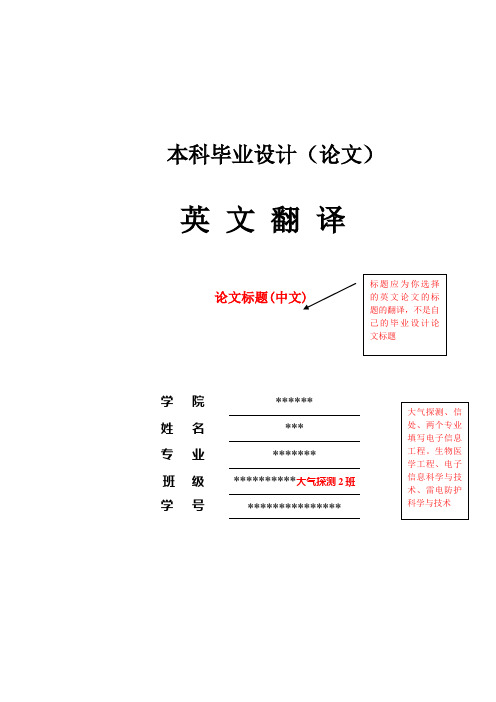
本科毕业设计(论文)英文翻译论文标题(中文)学院******姓名***专业*******班级**********大气探测2班学号*************** 大气探测、信处、两个专业填写电子信息工程。
生物医学工程、电子信息科学与技术、雷电防护科学与技术As its name implies, region growing is a procedure that groups pixels or subregions into larger regions based on predefined criteria. The basic approach is to start with a set of “seed ” points and from these grow regions by appending to each seed those gray level or color).be used to assignpixels to regions during the centroid of these clusters can be used as seeds.… … …左右手共面波导的建模与带通滤波器设计速发展之势,而它的出现却是源于上世纪本研究提出了一种新型混合左右手(CPW )的独特功能。
目前这种有效电长度为0°的新型混合左右手共面波导(CRLH CPW )谐振器正在兴起,这种谐振器工作在5GHz 时的体积比常规结构的谐振器缩减小49.1%。
有关图、表等表格和图片必须有说明,宋体五号公式:公式的编号用括号起写在右边行末,其间不加虚线。
图、表、公式等与正文之间要有6磅的行间距。
文中的图、表、附注、公式一律采用阿拉伯数字分章连续编号。
如:图2-5,表3-2,公式(5-1)等。
若图或表中有附注,采用英文小写字母顺序编号,附注写在图或表的下方。
- 1、下载文档前请自行甄别文档内容的完整性,平台不提供额外的编辑、内容补充、找答案等附加服务。
- 2、"仅部分预览"的文档,不可在线预览部分如存在完整性等问题,可反馈申请退款(可完整预览的文档不适用该条件!)。
- 3、如文档侵犯您的权益,请联系客服反馈,我们会尽快为您处理(人工客服工作时间:9:00-18:30)。
The Journal of Genetic Psychology. 2005, 160(4), 436--442The Effects of Locus of Control and Task Difficulty on Procrastination TRACY JANSSEN Department of Psychology Beloit CollegeJOHN S. CARTON Department of Psychology OglethorpeUniversityABSTRACT.The authors investigated the effects of locus of controlexpectancies and task difficulty on procrastination. Forty-two collegestudents were administered an academic locus of control scal e and a taskthat was similar to a typical college homework assignment.The studentswere randomly assigned to 1 of 2 task difficulty levels. Although none ofthe results involving task difficulty was significant, several resultsinvolving locus of control were significant. Specifically, analysesrevealed that students with internal locus of control expectancies tendedto begin working on the assignment sooner than students with externallocus of control expectancies. In addition, students with internal locus ofcontrol completed and returned the assignment sooner than students withexternal locus of control. The results are discussed within the context of J.B. Rotter's (1966, 1975, 1982) social leaming theory.PROCRASTINATION refers to the act of needlessly delaying a taskuntil the point of some discomfort—a behavior problem that many adultsexperience on a regular basis (Ferrari, Johnson,&McCown, 1995). Mostresearch on procrastination has focused on college students; researchers have estimated that anywhere from 46% (Solomon&Rothblum, 1984) to 95% (Ellis&Knaus, 1977) of college students regularly procrastinate on academic assignments. Research findings suggest that, the longer students are in college, the more they tend to procrastinate (Semb, Glick,&Spencer, 1979), although most students perceive such behavior as a problem that they would like to eliminate (Solomon&Rothblum,1984). In addition, procrastination has been associated with a variety of difficulties, including test anxiety, missed deadlines for assignments, poor semester grades, depressed affect, low self-esteem, and social anxiety (e.g., Beswick,Rothbun,&Mann,1988;Ferrari,1991;Ferrari et al.,1995;Lay,1986,1987;Lay&Burns,1991;Solomon&Rothblum,1984)TO better understand Procrastination,researchers have sought to identify personality variables associated with it(for a review,see Ferrari et al.,1995)One variable that has been studied is locus of control of reinforcement. locus of control refers to a generalized expectancy reflecting the degree to which individuals perceive consequences as contingent on their own behavior and abilities(internal control)rather than on some external force such as luck,chance,fate,or powerful others(external control;Rotter,1990).Because individuals with internal control expectancies perceive a contingent relation between theirbehavior and consequences,one might expect them to procrastinate less than individuals with external control expectancies.Previous research on the relation between locus of control and academic procrastination has produced mixed results.Several researchers have found no relation between the two variables (e.g.Briordy,1980; Ferrari,Parker,&Ware,1992).However,Trice and Milton(1987)found that procrastinators had grater external locus of control than nonprocrastinators. In addition,Rothblum,Solomon,and Murakami found that procrastinators were more likely than nonprocrastinators to attribute success on exams to external factors.One reason for the inconsistent findings may be that most researchers have used generalized expectancy scales instead of specific academic expectancy scales to predict academic procrastination(Trice,1985). According to Rotter’s(1966,1975,1982)social learning theory,domain—specific expectancy scales should provide better predictions of specific behaviors than genera1ized scales do.In the present study,we sought to extend previous research on the relation between locus of control and academic procrastination in several ways.First,we used a specific expectancy scale for academic performance in order to measure students’locus of control.Second,to measure procrastination and improve the external validity of thefindings,we used a behavioral measure of procrastination that was similar to a typical course assignment,whereas many previous studies have used self-report scales.Third,to better understand the process of procrastination,we operationally defined procrastination in several ways:time taken to initiate an assigned task,time taken to complete the assigned task,and time takento return the assigned task.Previous researchers have assessed only the date at which an assignment was returned,a procedure that makes it impossible to determine whether there were differences between individuals with internal and external control expectancies with respect to when they started and completed the task.Fourth,to investigate the effects of task difficulty on Procrastination,we assigned two different tasks.The hypotheses for the study were as follows:Hypothesis 1: Students with internal control expectancies will procrastinate less than those external control expectancies.Hypothesis 2: Students who receive the difficult assignment will procrastinate more than those who receive the easy assignment.Hypothesis 3: There will be an interaction between locus of control and task difficulty, such that students with external locus of control expectancies who receive the difficult assignment will procrastinate the most.MethodParticipantsThe participants for the study were 42 undergraduate students(10 men and 32 women). Their mean age was 19.7 years (SD=0.65). The students were enrolled in two psychology courses at a relatively small, midwestern U.S. college.College students were selected so that we could replicate previous studies and because of the relatively high rates of procrastination observed in this population.The students were predominantly Caucasian (90%) and middle class. They received credit toward their course grade for their participation.MeasuresLocus of control. Students completed the Academic Locus of Control Scale(ALC; Trice, 1985). The ALC is a 28-item, true-false scale designed to assess locus of control with respect to academic outcomes, with higher scores indicating greater externality. Trice (1985) reported a Kuder-Richardson 20 internal consistency coefficient of 0.70 and a 5-week test-retest reliability coefficient of 0.92 for the ALC with college students. In addition, scores on the ALC have been shown to be correlated in predicted directions with academic achievement, class participation, homework completion, and scores on the Rotter Internal-External Control Scale (Trice, Ogden, Stevens,&Booth, 1987).Procrastination. We measured the students' procrastination by recording the amount of time that passed between the date the task wasassigned and the dates the students began, completed, and returned the task to the teaching assistant.Specifically, the students were asked to take home a psychology article, read it,provide written answers to two questions about the article, and return their answers to the professor's teaching assistant. The questions about the article were presented on a work sheet that also included places for the students to record the times and dates they started, completed, and returned the assignment to the teaching assistant (the return date was verified by the teaching assistant, who checked the return box daily).Task difficulty. We manipulated task difficulty by using two articles of equal length and similar topic but of presumably different difficulty levels. The easy article was an article on human memory, written for the general public, in the magazine Psychology Today (Neimark, 1995). The difficult article was a research article on human memory taken from the journal Psychological Science(Robinson&Roediger,1997). To check the difficulty manipulation, we asked the students to rate on a 5-point scale how difficult they perceived the article they were assigned(1=very easy, 5=very difficult).ProcedureThe students were randomly assigned to receive either the easy or the difficult article. At the beginning of the semester, the students were administered a consent form and the ALC. After the forms werecompleted, the professor (a 32-year-old, male, Caucasian, assistant professor) assigned the articles and work sheets. The students were instructed to return the work sheets to the professor's teaching assistant (a 21-year-old, female, Caucasian, senior college student) for grading as soon as they were done. Thus, no specific due date was provided (in order to enhance variability in procrastination), although the students had been told that the assignment had to be completed by the end of the semester. After all of the work sheets were returned, the students were debriefed on the purpose of the study.ResultsScores on the ALC were analyzed to determine each student's locus of controt. Scores ranged from 3 to 18, with an overall mean of 9.64 (SD=3.81). Separate analyses for men and women resulted in the following means: men, 10.10(SD=2.85); women, 9.50 (SD=4.09). The mean scores for each gender were not significantly different, and they were comparable to means reported by Trice(1985) for college students. Students were separated at the median (9) into internal (n=22) and external (n=20) control groups.A 2 x 2 x 2 analysis of variance was used to analyze the data. The independent variables were students' gender (male, female), locus of control (internal,external), and task difficulty (easy, difficult). The dependent variables were the number of days between the date the articlewas assigned and the dates the students reported beginning, completing, and returning the assignment.To check the task difficulty manipulation, we first analyzed the students' ratings of the difficulty levels of the two articles. As expected, there was a significant main effect of task difficulty, F(1,41)=11.91,P<0.01,indicating that the students rated the research article (M=3.90) as more difficult to complete than the magazine article (M=2.62).With respect to the first hypothesis, there was a marginally significant main effect of locus of control when procrastination was defined as the number of days that passed before students began the assignment, F(1, 41)=3.04, p<0.09. Thus, there was a tendency for students with internal control expectancies (M=5.55 days) to begin the assignment earlier than students with external control expectancies (M=8.25 days).When procrastination was defined as the number of days that elapsed before students reported completing the assignment, there was a significant main effect of locus of control, F(l, 41)=6.54, p<0.01. As predicted, students with internal locus of control (M=6.05 days) took fewer days to complete the assignment than students with external locus of control (M=9.95 days).Finally, analysis of the number of days it took students to return the assignment revealed a significant main effect of locus of control, F(l,41)=6.23, p<0.05. As predicted, students with internal locus of control (M=7.64 days) took fewer days to return the assignment than students with external locus of control(M=12.15 days).Although several mean differences involving the task difficulty variable were in the predicted direction, none were statistically significant. In addition,there were no significant two- or three-way interactions on any dependent variable. Thus, the second and third hypotheses received no support. Moreover,there were no gender differences found on any measure, and an analysis of covariance holding age constant indicated that age differences did not account for the current results.DiscussionResearch has indicated that procrastination involves more than poor time-management skills. Rather, it involves a combination of affective, behavioral, and cognitive factors (Ferrari et al,1995; Solomon & Rothblurm, 1984). The results of the present study suggest that one cognitive factor is locus of control of reinforcement. Specifically, in this study, the students with internal control expectancies for academic outcomes t ook less time to complete and return the academic assignment than did the students with external control expectancies. There also was a trend for the students with internal locus of control to let fewer days pass before beginning to work on the assignment than did the students with external locus of control.The effect of locus of control on students' procrastination did not depend on the difficulty level of the assignment, as indicated by the nonsignificant interaction between locus of control and task difficulty. However, additional research with other tasks seems warranted before one can conclude that task difficulty does not have an effect on procrastination. Although the students perceived the research article as more difficult than the magazine article, it is possible that there was not a large enough difference in the difficulty levels of the two articles to produce significant results in the present study. The relatively small sample size in the present study also may have contributed to the lack of significant findings regarding the task difficulty variable.As noted in the introduction, previous research examining the relation between locus of control and procrastination has produced mixed results. On the basis of the present results, we believe that there is a relation between the two variables and that the inconsistency in earlier findings may be attributable to two factors: (a) Researchers often have administered generalized expectancy scales instead of specific academic expectancy scales to predict academic behavior; and (b) researchers have used different self-report scales to measure procrastination,and it is not currently known how well the different measures are correlated with one another.The present results are consistent with predictions based on Rotter'ssocial learning theory for behavioral differences between individuals with internal or external locus of control expectancies. The individuals who perceived a contingent relation between their behavior and environmental consequences procrastinated less than the individuals who perceived consequences as contingent on external factors such as luck, chance, or fate. Given that locus of control expectancies can be measured reliably by the time children are of preschool age (e.g., Mischel, Zeiss,&Zeiss, 1974; Skinner, 1986; Stephens&Delys, 1974)—and probably before procrastination habits develop—one can conclude that locus of control precedes and contributes to procrastination. However,because the present study was cross-sectional and correlational in design, it is impossible to conclusively determine the direction of causality. Thus, it is possible that procrastination contributes to locus of control or that the relation between the two variables is bidirectional. Future longitudinal research may help to determine the direction of causality.Another limitation of the present study is that the findings cannot be generalized beyond primarily Caucasian students attending college in the United States. Although it is important to study this population in order to compare the present results with the results of previous research, studies are needed with participants of different ages, ethnicities, and occupations to determine the robustness of the findings.REFERENCESBeswick, G,Rothbun, E. D,&Mann, L. (1988). Psychological antecedents to student procrastination. Australian Psychologist, 23, 207-217.Briordy. R. (1980). An exploratory study of procrastination. Dissertation Abstracts International, 41, 590.Ellis, A.,&Knaus, W. J. (1977). Overcoming procrastination. New York: Institute for Rational Living.Ferrari, J. R. (1991). Compulsive procrastination: Some self-reported characteristics. Psychological Reports, 68, 455-458.Ferrari, J. R., Johnson, J. L.,&McCown, W. G. (1995). Procrastination and task avoidance: Theory, research, and treatment. New York: Plenum.Ferrari, J. R., Parker, J. T.,&Ware, C. B. (1992). Academic procrastination: Personality correlates with Myers-Briggs types, self-efficacy, and academic locus of control. Jour- nal of Social Behavior and Personality, 7, 495-502.Lay, C. H. (1986). At last, my research article on procrastination. Journal of Research in Personality, 20, 474-495.Lay, C. H. (1987). A modal profile analysis of procrastination: A search for types. Personality and Individual differences, 8, 705-714.Lay. C. H.,&Burns, P. (1991). Intentions and behavior in studying for an examination:The role of trait procrastination and its interaction with optimism. Journal of Social Behavior and Personality, 6, 605-617.Mischel, W., Zeiss, R,&Zeiss, A. (1974). Internal-external control and persistence: Validation and implications of the Stanford Preschool Internal-External Scale. Journal of Personality and Social Psychology, 29, 265-278.Neimark, J. (1995). It's magical, it's malleable, it's memory. Psychology Today, 28, 44-49.Robinson, K. J.,&Roediger, H. L.(1997). Associative processes in false recall and false recognition. Psychological Science, 8, 231-237.Rothblum, E. D., Solomon, L. J.,&Murakami, J. (1986). Affective, cognitive, and behavioral differences between high and low procrastinators. Journal of Counseling Psychology, 33, 387-394.Rotter, J. B. (1966). Generalized expectancies for internal versus external control of reinforcement. Psychological Monographs, 80(Whole No. 609).Rotter, J. B. (1975). Some problems and misconceptions related to the construct of internal vs external control of reinforcement. Journal of Consulting and Clinical Psychology, 48, 56-67.Rotter, J. B. (1982). The development and applications of social learning theory: Selected papers. New York: Praeger.Rotter, J. B. (1990). Internal versus external control of reinforcement: A case history of a variable. American Psychologist, 45, 489-493.Semb, G., Glick, D. M.,&Spencer, R. E. (1979). Student withdrawals and delayed work patterns in self-paced psychology courses. Teaching of Psychology, 6, 23-25. Skinner, E. A. (1986). The origins of young children's perceived control: Mother contingent and sensitive behavior. International Journal of Behavioral Development, 9,359-382.Solomon, L. J.,&Rothblum, E. D. (1984). Academic procrastination: Frequency and cognitive-behavioral correlates. Journal of Counseling Psychology; 31, 503-509. Stephens, M. W.,&Delys, P (1974). External control expectancies among disadvantaged children at preschool age. Child Development, 44, 670-674.Trice, A. D. (1985). An academic locus of control scale for college students. Perceptual and Motor Skills, 61, 1043-1046.Trice, A. D.,&Milton, C. T. (1987). Locus of control as a predictor of procrastination among adults in correspondence courses. Perceptual and Motor Skills, 65, 1002. Trice, A. D., Ogden, E. P, Stevens, W.,&Booth, J. (1987). Concurrent validity of the academic locus of control scale. Educational and Psychological Measurement, 47,483-186.。
